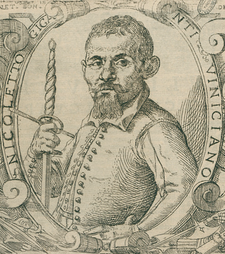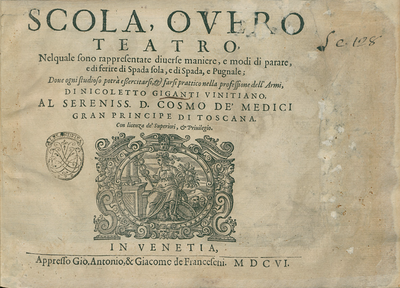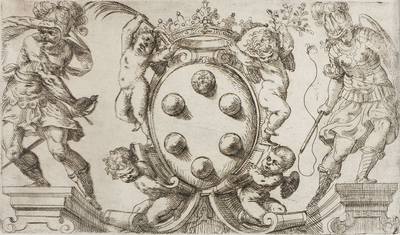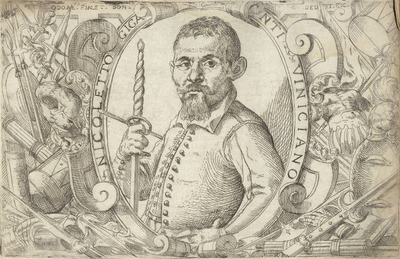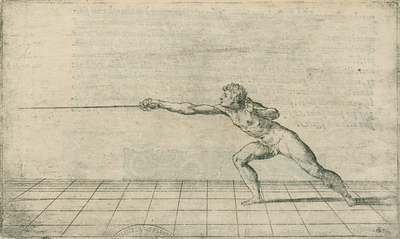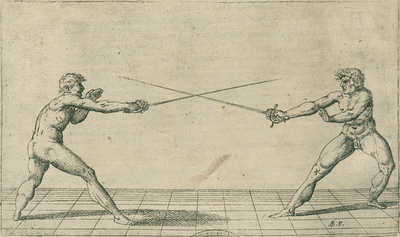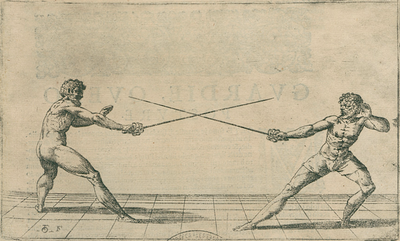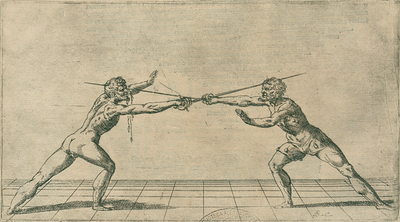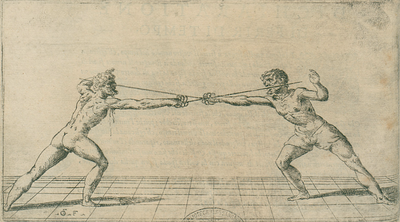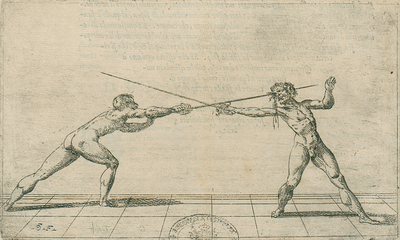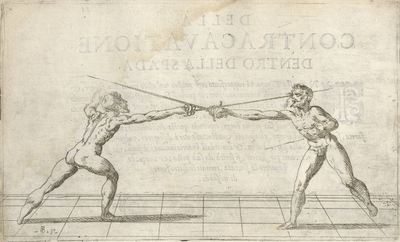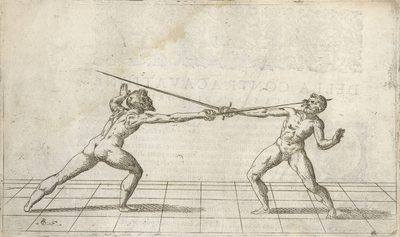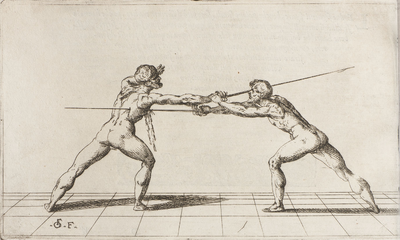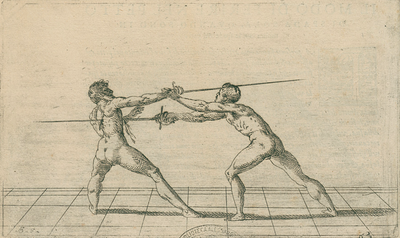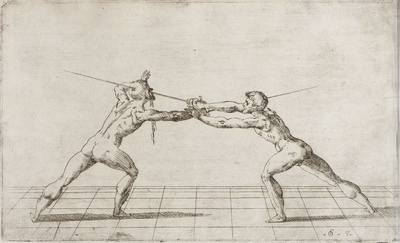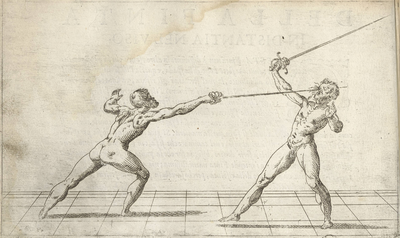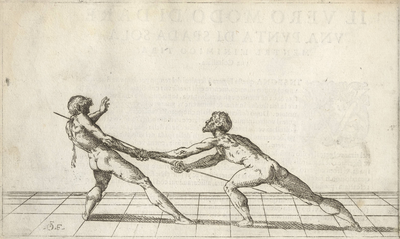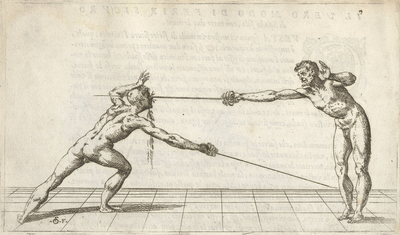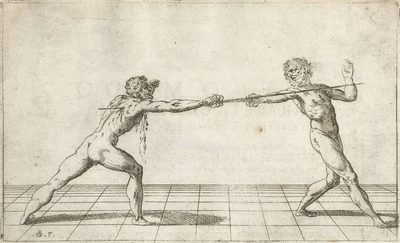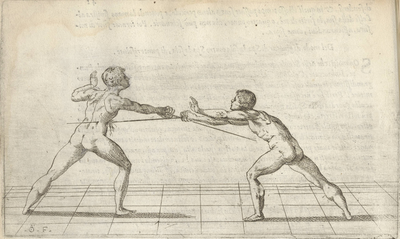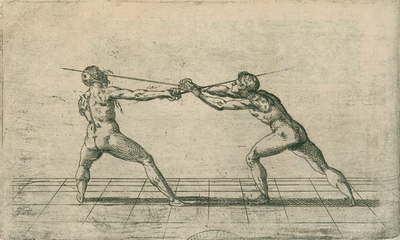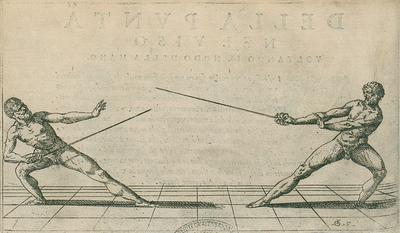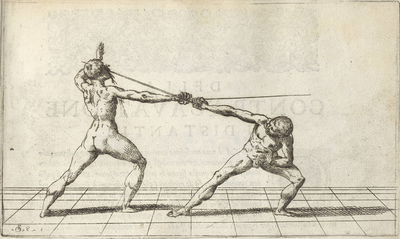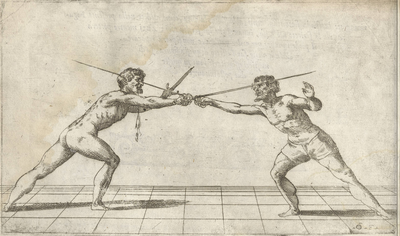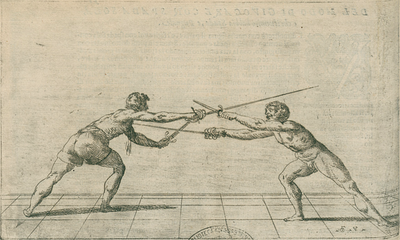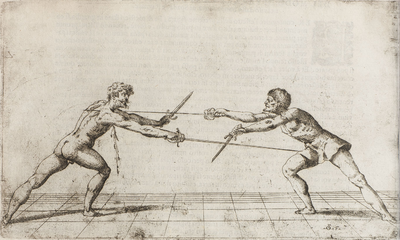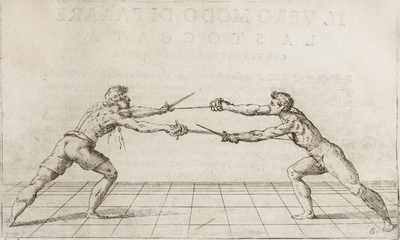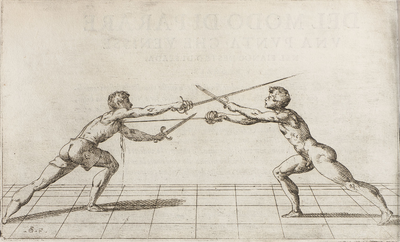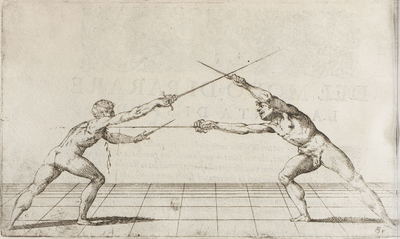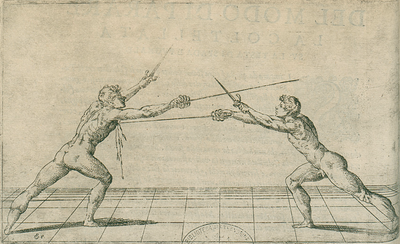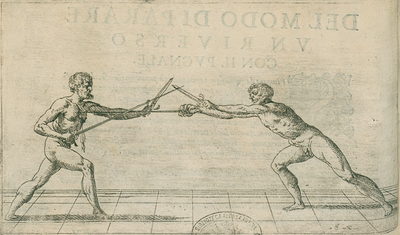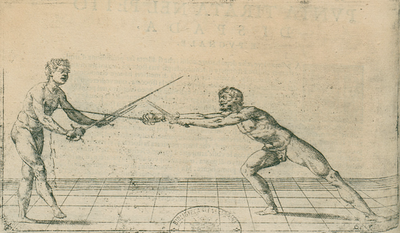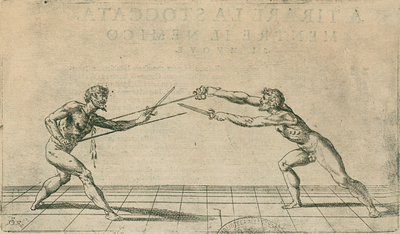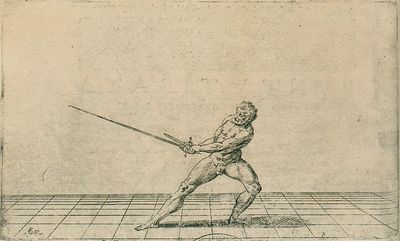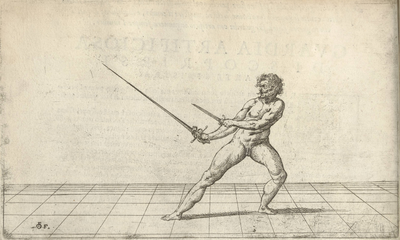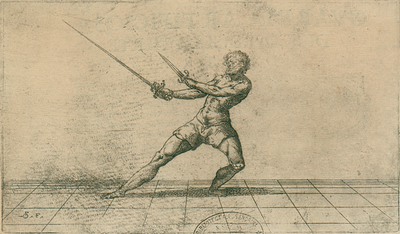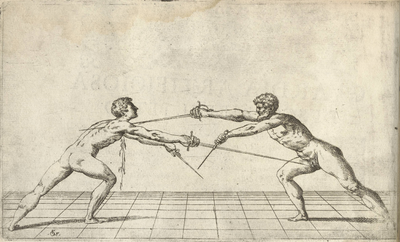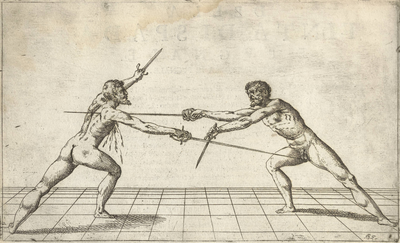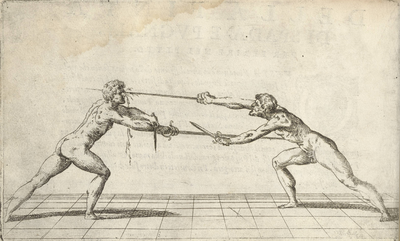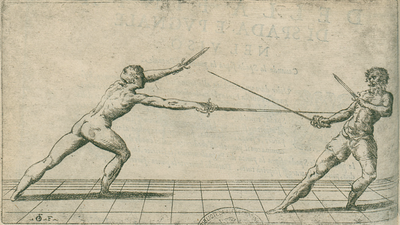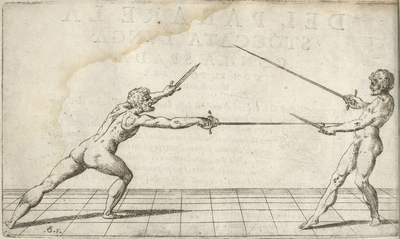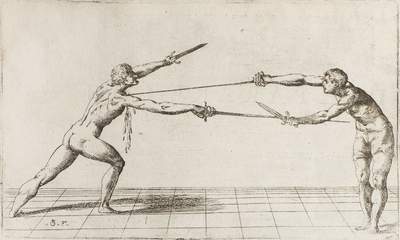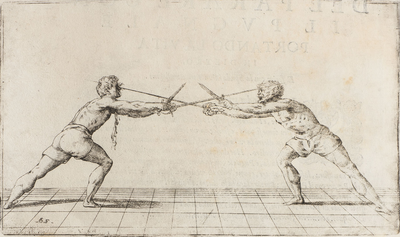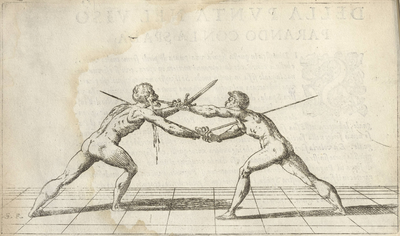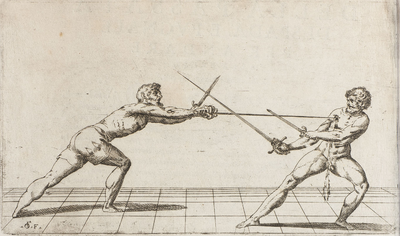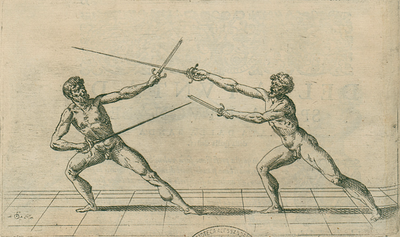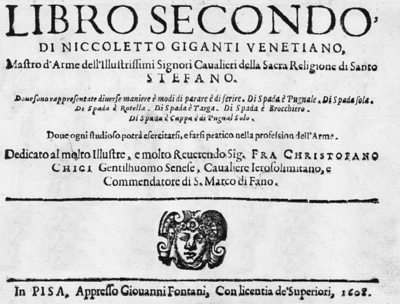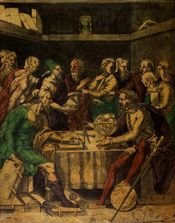Illustrations
from the 1606
|
Draft Translation 
by Jeff Vansteenkiste
|
First Edition (1606) [edit]
Transcribed by Jeff Vansteenkiste
|
German Translation (1619) [edit]
Transcribed by Jan Schäfer
|
French Translation (1619) [edit]
Transcribed by Olivier Delannoy
|
|
|
|
|
[01] Fechtschul: Darinnen angezeiget wie man auff vnterschiedlich weisen das Rapier allein, oder beneben dem Dolchen beydes zum außschlagen vnnd zum treffen, gebrauchen soll.
Deß Nicolai Gigantis von Venedig.
|
[01] Ecole ou Théâtre: Auquel sont représentées diverses manières de se servir de l’épée seule, ou accompagnée du poignard, tant pour détourner que pour donner le coup.
De Nicolas Giganti Vénitien
|
|
|
[1] Guards and Counterguards
It is necessary for someone wishing to become an expert on the science of arms to understand many things. To give my lessons a beginning, I will first begin to discuss guards and counterguards, or postures and counterpostures, of the sword. This because, coming to some incident of contention, it is first necessary to understand this to be able to secure oneself against the enemy. To position oneself in guard, therefore, many things must be observed, as seen in my figures: Standing firm over the feet, which are the base and foundation of the entire body, in a just pace, restrained rather than long in order to be able to extend, holding the sword and dagger strongly in the hands, the dagger now high, now low, now extended, the sword now high, now low, now on the right side, in place in order to parry and wound so that the enemy, throwing either a thrust or cut, can be parried and wounded in the same tempo, with the vita disposed and ready because lacking its disposition and readiness it will be an easy thing for the enemy to put it into disorder with a dritto, a riverso, a thrust, or in some other manner, and even if such a person were to parry, they would remain in danger. It is advised that the dagger should guard the enemy’s sword because if the enemy throws, it will parry that, and that the sword should always aim at the uncovered part of the enemy so that he is wounded when throwing. This is all the artifice of this profession. Moreover, it must be noted that all motions of the sword are guards to those who know them, and all guards are good for the practised person, as, on the contrary, no motion is a guard to those who do not understand any, and they are not good for those who do not know how to use them.
|
[02] DELLE GUARDIE, E CONTRAGUARDIE.
VOLENDO alcuno farsi professore della scientia dell’armi, gli è necessario conoscere molte cose, & per dare à queste mie lettioni principio, comincierò prima à trattare delle guardie, e contraguardie, ò vogliamo dire posture, & contraposture della spada; & questo, perche venendosi à qualche accidente di questione, è necessario conoscere prima questo per poter si contra l’inimico assicurare. A volersi dunque metter in guardia hanno da esser molte cose osservate, come si vede in queste figure mie; & è lo star fermo sopra i piedi, che sono base, & fondomento di tutto il corpo, in un passo giusto, & più presto ristretto che longo, per il poter crescere: tener la spada, & il pugnal forte nelle mani: il pugnale hora alto, hora basso, hora disteso; la spada hora alta, hora bassa; hora al destro lato in atto sempre di riparare, e di ferire, si che tirendo l’inimico, ò di punta, ò di taglio possi riparare, & ferire in un istesso tempo, con la vita disposta e pronta; perche mancando la dispositione, & la prontezza di quella, facil cosa sarà all’inimico il poterla porre in disordine, ò con un dritto, ò con un riversicco; ò con una punta, ò in altra maniera; e quel tale benche riparasse rimarebbe in pericolo. Egli è avertire che il pugnale guardi la spada nemica, per- [03] che se il nemico tira, quello pari, & che la spada miri sempre la parte discoperta del nemico; si che tirando resti l’inimico ferito. Et questo è tutto l’artificio di questa professione. Di più si deve notare che tutti li moti della spada sono guardie à chi li sà conoscere; & tutte le guardie perchi essercita sono buone; come all’incontro à chi non intende nessono moto e guardia; & perchi non le sà usare, non sono buone.
|
Von Huthen vnd Gegenhuthen.
WElcher sich der Profession der Wissenschafft der Waffen will annehmen, muss vieler Sachen gute Wissenschafft haben. Darumb ich auch zum Anfang dieser meiner Lectionen, erstlich von den Huthen vnd Gegenhuthen will nach notthurfft handeln (Es seynd aber dieses nichts anderes als die Stellungen vnd Gegenstellungen des Rapiers) wie denn dieses das erst ist, daß man in einem zufaͤlligen Streit, soll vnnd muß in achtung nehmen, auff daß man fuͤr des Gegentheils Wehren sicher sey. Wenn man sich aber recht will in die Huth legen, muss man viel ding fleissig in acht nehmen, wie denn in nachfolgenden Figuren gnugsam zu sehen. Nemlich daß man die Fuͤß, welche die basis vnnd das Fundament des gantzen Leibs seynd, fest stelle: in einem gebuͤhrlichen Schrit halte, ehe kurz als zu lang auff das man ihn mehren koͤn= [02] ne, dz Rapier vnnd den Dolchen fest in der Hand halten, bald hoch bald nider, bald außgestrecket: dz Rapier sonderlich bald hoch, bald nider, bald auff die rechte Seite, bald auff die lincke, wie es denn die Gelegenheit ein Streich ab zukehren, oder zu thun geben moͤchte, also dz wann der Gegentheil einen Stich, oder einen Haw thete man ihn abkehren vnd gleich mit in einer Zeit treffen koͤnne: mit einer hurtigen vnd gewissen Stellung des Leibs. Dann solte es an Hurtigkeit vnd gewißheit der Stellung fehlen, so wuͤrdt es den Feind leicht in eine Vnordnung bringen, entweder durch ein zwerchen, oder einen stracken Hieb, oder durch einen Stich oder irgendt auf eine andere weise, dz ob man ihn schon wolte abkehren oder außschlagen, so blieb man doch allzeit in der gefahr. Vnd muss man dahin bedacht sein, dz der Dolchen allezeit auff des Gegentheils Rapier sehe, den Streich welchen der Gegentheil wolte thun auff zufangen: dz Rapier aber soll auff dz entbloͤste Theil des gemelden Gegentheils gerichtet sein, also dz wann man einen Streich fuͤhret, er damit getroffen werde, darinnen denn die ganze Kunst dieser Profession bestehet. Darnach muss man auch mercken dz alle bewegungen des Rapiers Huthen seind, dem der sie recht kan erkennen, vnd dz alle Huthen gut vnd dienlich seynd, dem der sie recht weiß zugebrauchen: hergegen aber dient kein bewegen zur Huth dem, der sich nit darauf verstehet: wie sie dem auch nit dienet, der jrer nit weiß zugebrauchen.
|
Des gardes & contregardes.
CElui qui prétend de se faire professeur de la science des armes, a besoin de la connaissance de plusieurs choses. Dont pour donner commencement à ces miennes leçons, je traiterais premièrement des gardes & contregardes, c’est à dire des postures & contrepostures, de l’épée, pour ce que c’est la première chose, à laquelle survenant quelque occasion de querelle, il faut avoir égard, pour se pouvoir assurer de l’ennemi. Pour donc se mettre en garde, il y a beaucoup de choses à observer, comme on peut voir es figures suivantes: A savoir de se mettre à pieds fermes, iceux étant la base et fondement de tout le corps en pas juste, plutôt restreint que trop long pour le pouvoir accroître: tenir l’épée & le poignard bien ferme [02] en la main, tantôt haut, tantôt bas, tantôt étendu: l’épée aussi, tantôt haute, tantôt basse, tantôt du côté dextre, tantôt au senestre, selon que l’occasion de détourner ou de donner le coup se présente, de sorte que l’ennemi tirât de la pointe ou de taille, on le puisse détourner & blesser en même temps, avec la vie, ou le corps disposé et prompt. Pour ce la disposition & promptitude du corps faillant, ce sera chose facile à l’ennemi, de le mettre en désordre, ou par une traverse, ou par un coup droit, ou par un coup de pointe, ou par quelque autre manière, en sorte que combien on voudrait reparer, ou détourner le coup, on demeurerait toutefois en danger. Et faut être averti, que le poignard doit garder l ‘épée de l’ennemi, pour parer le coup que l’ennemi voudrait donner: & que l’épée regarde toujours la partie découverte de l’ennemi, en sorte qu’en tirant le coup il en demeure blessé. Et en ceci consiste tout l’artifice de cette profession. Puis faut-il aussi noter que tous les mouvements de l’épée sont des gardes à celui qui les peut connaître: & que toutes les gardes sont bonnes à celui qui s’en sert dextrement: Mais au contraire nul mouvement sert de garde à celui qui ne s’y entend: & ne peut être bon à celui qui n’en sait faire.
|
|
|
[2] This profession requires nothing more than science and practice. Practised, it bestows the science. Placing oneself uncovered in guard is artifice and done so that the enemy disorders himself when throwing and ends up in danger. Placing oneself covered is also artifice because, binding the enemy, it is possible to wound. In this way, it can be understood that every guard aids those who understand and know, and no guard is valuable to those who do not understand or know. This is enough about guards.
|
Questa professione altro non ricerca che scienza, & essercitio, & questa essercitata dona la scienza. Il mettersi discoperto in guardia è artificio, e questo si fà perche l’inimico tirando si metta in disordine, & resti in pericolo: come anco il mettersi coperto è artificio, perche stringendo l’inimico possi ferire; di maniera che si può intendere, che ogni guardia gioua à chi intende, & conosce; & à chi non intende, & conosce, nessuna guardia vale; & questo è quanto alle guardie.
|
Diese Profession erfordert nichts anders als Wissenschafft vnd Vbung, vnd kompt gemelde Wissenschafft aus der Vbung vnd ist eine Kunst dz man sich bloß in die Huth kan legen, welches zu diesem ende geschihet, dz der Gegentheil verlocket, sich mit Gefahr wage einen Streich zu thun. So ist es auch eine Kunst, sich in eine bedeckte Huth zu legen, also dz man ohne Gefahr an Gegentheil setzen, vnd ihn treffen koͤnne darauß man abzunehmen, dz alle Huth dem nutzlich ist, der sie verstehet: vnd den nichts hilfft, so deren keinen verstand hat, vnd dieses von der Huth.
|
Cette profession ne requiert autre chose que science et exercice: & étant exercée donne la science. C’est un artifice de se mettre en garde à découvert: & se fait afin que l’ennemi voulant donner le coup, se mette en désordre & danger. Aussi est-ce un artifice de s’y mettre à couvert, en sorte que serrant l’ennemi on le puisse atteindre. Donc on s’aperçoit, que toute garde est utile à celui qui l’entend, & ne profite à rien à celui qui ne l’entend point. Et voici quant aux gardes.
|
|
|
[3] As for counterguards, it is advised that someone who has knowledge of this profession will never position himself in guard but will seek to position himself in a counterguard. Wanting to do so, know this: One must position oneself outside of measure—that is, at a distance—with the sword and dagger high, strong with the vita, with a firm and stable pace, then consider the guard of the enemy. Afterwards, approach him little by little, binding with the sword to be safe—that is, almost resting your sword on his so that it covers it—because he will not be able to wound if he does not disengage the sword. The reason for this is that in disengaging he performs two actions: First, he disengages, which is the first tempo, then wounding, which is the second. While he disengages, he can come to be wounded in many ways in the same tempo before he has time to wound, as will be seen in the figures of my book. If he changes guard due to the counterguard, it is necessary to follow him with the sword forward, with the dagger alongside always securing his sword, because in the first tempo he will always have to disengage the sword and necessarily ends up wounded. Neither will it ever be possible for him to wound if not with two tempi, and from those parrying will always be a very easy thing. This is enough about guards and counterguards.
|
Quanto alle contraguardie è d’avertire, che uno c’haverà cognitione di questa professione, mai si metterà in guardia, ma cercherà di mettersi contra le guardie; & volendosi mettere contra alle guardie, è d’avertire questo; che bisogna mettersi fuora di misura, cioè in distantia, con la spada, & il pugnal alto, forte con la vita, & con il passo fermo, e saldo; poi considerar la guardia del nemico; di poi andarlo pian piano con la spada stringendo alla sicuratione della sua, cioè con l’appoggiar la spada quasi alla sua, si che la copra, perche non possi ferire, se non cava la spada: la ragione è questa, che cavando lui fa due effetti: prima cava; ecco il primo tempo, poi ferisce ecco il secondo; mentre egli cava in quell’istesso tempo può restar ferito in molte maniere, come si vedrà nelle figure di questo mio libro, prima che habbi tempo di ferire; se egli si muta di guardia per la contraguardia bisogna seguirlo con la spada inanzi, e con il pugnal longo assicurando sempre la spada sua, perche egli sempre nel primo tempo, c’haverà à cavar la spada habbi à restar ferito, ne possi lui mai ferire, se non con due tempi; dalli quali ripararsi sarà sempre facilissima cosa: & questo è quanto alle guardie, e contraguardie.
|
Die Gegenhuth belangend: Jst zu mercken daß der so diese Profession recht verstehet, sich nimmer auff die Huth wirdt legen, sondern sich befleissen daß er sich in der Gegenhuth verhalte. Sich aber in die Gegenhuth zulegen, muß man in acht nemmen das man ausser dem maß, dz ist in der Weite halte, mit dem Rapier vnnd Dolchen in der hoͤhe, den Leib fest vnnd in steifen vnnd gewissen Schritt, [03] darnach muß man des Gegentheils Huth bedenken, vnnd allgemach mit dem Rapier an ihn setzen, doch daß man fuͤr seinem versichert sey: nemlich daß man das Rapier auff Gegentheils Rapier halte, vnd es also decke, daß er keinen Streich thun kan er wende es dann, dessen dieses die Vrsach ist: daß wann er sein Rapier wendet, bringt er zweyerley Zeit zu: die Wendung fuͤr sich selbst, welche die erste Zeit: darnach der Streich: welches die andere ist, vnd vnder dessen daß er es wendet, kan er auf vielerhand weise beschaͤdiget werden (wie man in den Figuren dieses meines Buchs sehen wird) ehe er die zeit hat gemelten Streich zufuͤhren, wenn er sich aber auß der Huth in die Gegenhuth begibt: so muß man jhm mit vorgehaltener Wehr nachfolgen vnd sich allzeit vor seinem Rapier versichern, mit der lenge des Dolchens: also das man jhn in der ersten Zeit der wendung seines Rapiers erreiche, vnd er seinen Streich ander als in zwoen Zeiten fuͤhren koͤnne, fuͤr welchen man sich leichtlich versehen kan, welches von Huthen vnd gegenhuthen gnug sey.
|
Quant aux contregardes: Faut noter que celui qui a la connaissance de cette profession, jamais ne se mettra en garde, mais tâchera de se mettre en contregarde. Et pour se mettre en contregarde, il faut être averti, de se mettre hors de mesure, c’est à dire, en distance, avec l’épée et le poignard haut, la vie forte, & le pas ferme & assuré. Puis faut considérer la garde [03] de l ‘ennemi; en après le serrer peu à peu, de l’épée avec assurance de la sienne, à savoir en joignant l’épée à celle de l’ennemi, en la couvrant en sorte qu’il ne puisse donner coup, s’il ne cave ou tourne l’épée. Et en voici la raison: s’il tourne l’épée, il fait deux temps: le premier est, le tour même, qui est le premier temps, puis il donne le coup, qui est le second. Et cependant qu’il tourne, il peut être blessé de plusieurs manières (comme on verra es figures de ce mien livre) devant qu’il aie le temps de pouvoir donner le dit coup. Mais s’il change de garde en contregarde, il le faut suivre avec l’épée au devant, & s’assurer toujours de son épée avec le long du poignard: en sorte que toujours au premier temps du tour de son épée, il puisse être atteint, & ne puisse donner coup sinon en deux temps: desquels on se pourra reparer très facilement: Ce qui suffira quant aux gardes & contregardes.
|
|
|
[4] Tempo and Measure
It is not through knowing how to position oneself in a guard or counterguard, nor how to throw a thrust, an imbroccata, a mandritto, or a riverso, nor how to turn the wrist, nor how to carry the body well, nor how best to control the sword, that a person can be said to know how to parry and wound. Rather, it is by understanding tempo and measure. Someone who does not understand these, even though he parries and wounds, could not be said to understand how to parry and wound, because such a person can err and incur a thousand dangers in parrying as in wounding.
|
[04] DEL TEMPO, ET DELLA MISURA.
NON per sapersi metter in guardia, overo contro alla guardia, nè per saper tirar una punta, un’imbroccata, un mandritto, ò un riverscio; nè per saper far nodi di mano, nè per portar bene il corpo, nè per meglio dominar la spada, si può dire di saper riparare, & di saper ferire: ma per conoscer il tempo, & la misura, le quali chi non conosce, benche ripara, & benche ferisca, non si può dire di sapere e riparer, e ferire; perche così nel riparare, come nel ferire può errare, & incorrere in mille pericoli.
|
Von der Zeit vnd dem Maß.
ZUm recht vnd wohl abkehren vnd schlagen, ist es nicht gnug, daß man sich wohl wisse auf die Huth zu legen, oder einen Stich, Haw oder Zwerghaw thun, oder einlauffen vnd dem Gegentheil die Haͤnde binden: sondern dieses wird darzu erfordert, nemlich daß man sich wol auf die Zeit vnd auff das Maß verstehe, vnnd welcher sich darauff nicht verstehet, wiewol er außschlegt, vnd wie hurtig er zuschlaegt, von dem kan man doch nit sagen, dass er wohl außschlagen vnd schlagen koͤnne: Sintemal er beydes im abkehren, vnd im schlagen manchen Fehler kan begehen, dardurch er in tausenderley gefahr moechte gerathen.
|
Du temps & de la mesure.
CE n’est point pour bien pouvoir se mettre en garde ou contregarde, ne pour savoir bien tirer l’estoc, une mandritte & traverse, ne pour savoir nouer les mains ou manier bien l’épée, qu’on est estimé de bien reparer & frapper: ainsi pour bien s’entendre au temps & à la mesure. Et celui qui ne s’y entend, combien qu’il repare, & combien qu’il frappe, si ne peut-on dire, qu’il sache bien reparer & frapper, pour ce que tant au frapper qu’au reparer il peut commettre quelque erreur, & encourir en mille dangers.
|
|
|
[5] Having therefore discussed guards and counterguards, it remains to discuss tempo and measure in order to then know how to accommodate a recognition of when one must parry and wound.
|
Havendo dunque trattato delle guardie, e contraguardie, resta trattare del tempo, & della misura, per sapersi poi accommodar à conoscer quando si deve riparare, e ferire.
|
Demnach ich derhalben von der Huth vnd Gegenhuth gnugsamen Bericht gethan, erfordert es die notthurfft daß ich auch von der Zeit handele, auff daß man sich so wol in dem abkehren als auch in dem schlagen wisse zurichten.
|
Ayant donc traité des gardes et contregardes, s’ensuit que je traite aussi du temps, pour s’y pouvoir accommoder sachant quand on doit reparer ou frapper.
|
|
|
[6] Measure, then, means when the sword can reach the enemy. When it cannot, it is called being out of measure.
|
La misura dunque s’intende quando con la spada si può arrivar l’inimico; & quando non si può, s’intende esser fuor di misura.
|
Durch das Maß verstehet ein solches spacium oder distantz darin man den Gegentheil koͤnne erreichen, vnd wenn man so weit davon [04] stehet, daß man jhn nicht erreichen kan, so nennet man es, sich ausser dem maß halten.
|
Par la mesure on entend tel espace ou distance, qu’on puisse atteindre l’ennemi de l’épée: & quand on se [04] tient plus loin, & on ne le peut plus joindre on se dit être ou se tenir hors de mesure.
|
|
|
[7] Tempo is recognized in this way: If the enemy is in guard, one needs to position oneself outside of measure and advance with one’s guard, securing oneself from the enemy’s sword with one’s own, and put one’s mind on what he wishes to do.
|
Il tempo si conosce in questo modo: se l’inimico è in guardia, bisogna mettersi fuor di misura, & andar con la sua [05] guardia assicurandosi dalla spada nemica con la sua, & poner mente à quanto egli vuol fare:
|
Die Zeit versteht man auff nachfolgende weise. Wenn der Gegentheil in der Hut ligt, so muß man sich ausser dem Maß halten, vnd in seiner eignen Huth sich mit seiner Wehr fuer Gegentheils Rapier versichern, vnd vnder dessen gute achtung darauff geben, was er thun koͤnne oder woͤlte.
|
Le temps se connaît en cette manière: Si l’ennemi est en garde, il se faut mettre hors de mesure, & se tenant aussi sur la sienne, s’assurer avec son épée de celle de l’ennemi, & bien prendre garde à ce qu’il veut ou peut faire:
|
|
|
[8] If he disengages, in the disengagement he can be wounded, and this is a tempo. If he changes guard, while he changes is a tempo. If he turns, it is a tempo. If he binds to come to measure, while he walks before he arrives at measure is a tempo to wound him. If he throws, parrying and wounding in one tempo is also a tempo. If the enemy stands still in guard in order to wait and you advance to bind him and throw where he is uncovered when you are at measure, it is a tempo. This is because in every motion of the dagger, sword, foot, and vita, such as changing guard, is a tempo in the way that all these things are tempi—because they contain different intervals. While the enemy makes one of these motions, he will certainly be wounded because while one moves one cannot wound. It is necessary to learn this in order to be able to wound and parry. I will be demonstrating more clearly how one must do so in my figures.
|
se egli cava, nel cavare si può ferirlo, e questo è tempo: se egli si muta di guardia, mentre si muta è tempo: se egli gira, è tempo: se egli stringe per venir in misura, mentre camina prima ch’arrivi in misura, è tempo di ferirlo: se tira, riparar e ferir in un tempo, anche questo è tempo: se l’inimico stà in guardia fermo per aspettare, andar à stringerlo, e come sete in misura tirar, ove è discoperto, è tempo; perche in ogni moto di pugnale, di spada, di piede, & di vita, come mutarsi di guardia, è tempo. Di maniera che tutte queste cose sono tempi; perche hanno in sè diversi intervalli; & mentre l’inimico farà uno di questi moti, senza dubbio bisogna, che resti ferito; perche mentre si muove, non può ferire. Et questo è necessario sapere per poter ferire, & riparare; il che più distintamente andrò mostrando, come si debba fare nelle mie figure.
|
Wenn er die Hand wendet, so ist es eine Zeit darin er kan geschlagen werden: Endert er die Huth, so ist auch die Enderung eine Zeit: wendet er sich, so ist es abermals eine Zeit: Nahet er herbey auff daß er in das maß komme, so ist auch solches herbey rucken, ehe er dahin kompt eine Zeit darinnen er kan geschlagen werden. Fuͤhret er einen Streich es sey zum Stechen oder zum Hawen, so ist es abermals eine Zeit darin man abkehren vnd schlagen kan auff ein mahl: ligt er in der Huth vnd wartet, so ist es eine Zeit darin man auff jhn rucket, vnd innerhalb dem maß jhn antrifft da er sich entbloͤsset. Mit einem wordt: alle bewegung des Dolchens, des Rapiers, des Fusses, vnd des Leibs, als wenn man sich in die Huth leget, ist eine Zeit, deren man zum vortheil gebrauchen kan. Dann in solchen bewegungen finden sich gewisse interuella oder Zeiten, in welchen der Gegentheil also auffgehalten wird, dz er vnder dessen ohne zweiffel kann vbereilet werden. Dann in dem er sich beweget, kan er nicht schlagen. Vnd dieses ist beydes das Maß vnd die Zeit darauff man sich wol muß verstehen, wenn man recht abkehren vnnd schlagen will, wie in folgenden Lectionen vnd Figuren klaͤrlicher soll gezeiget werden.
|
S’il cave, c’est un temps auquel on peut le frapper: s’il change de garde, ce changement est un temps: s’il se tourne, c’est un temps: s’il s’approche pour venir en mesure, cependant qu’il chemine devant d’y parvenir, c’est un temps, auquel il peut être frappé: S’il tire le coup soit d’estoc ou de taille c’est encore un temps de parer & frapper ensemble: s’il se tient en garde pour attendre, c’est aussi un temps, auquel il faut le serrer & le frapper. Etant en mesure ou on le trouvera découvert. Or tout mouvement de poignard, d’épée, de pied, & de corps, comme quand on se met en garde, est un temps duquel on se peut servir. Car il y a en ces mouvements certains intervalles, esquels l’ennemi étant empêché sans doute peut être prévenu et frappé: Vu qu’en se mouvant il ne peut frapper. Et voici la mesure & le temps, desquels il faut avoir bonne intelligence pour bien pouvoir parer & frapper. Ce qui sera montré plus distinctement es leçons et figures suivantes.
|
|
|
[9] The method of throwing the stoccata
Now that we have discussed the guards, counterguards, measures, and tempi, it is a necessary thing to demonstrate and give knowledge of how to hold the vita in order to throw a stoccata and escape since wanting to learn this art it is first necessary to understand how to carry the vita and throw stoccate that are long, as seen in this figure, and all is in throwing brief, strong, and immediate stoccate, withdrawing backward outside of measure. To throw the long stoccata, one must place themselves in a just and strong pace, short rather than long in order to be able to extend, and in throwing the stoccata stretch the sword arm, bending the knee as much as possible. The proper method of throwing the stoccata is after placing oneself in guard, it is necessary to throw the arm first, then extend forward with the vita in one tempo so that the stoccata arrives and the enemy does not perceive it. If the vita were brought forward first the enemy could notice it and, availing himself of the tempo, parry and wound in one tempo.
|
[07] Del modo di tirar la Stoccata.
HORA che trattato habbiamo di guardie, & contraguardie, di misure, e di tempi, è cosa necessaria dimostrare, & dare ad intendere come s’habbi à portar la vita per tirare una stoccata, & salvarsi; poiche à voler imparare quest’arte è necessario il saper prima portar la vita, & tirar le stoccate longhe, quanto si vede in questa figura: & il tutto stà nel tirare le stoccate longhe, & preste, & forti, & subbito, ritirarsi in dietro fuori della misura. A tirare la stoccata longa, bisogna mettersi con un passo giusto, & forte, più tosto curto, che longo, per poter crescere, & nel tirar la stoccata allongar il braccio della spada, inchinando il ginocchio quanto si può. Il vero modo di tirar la stoccata è che doppo l’essersi messo in guardia, bisogna prima tirar il brazzo, & poi crescer inanzi con la vita in un tempo, che così la stoccata arriva, che’l nemico non se ne avvede; che se prima si portasse inanzi la vita, il nemico se ne avvederebbe, & così servendosii del tempo potrebbe riparare, & ferire in un tempo.
|
[05] Wie der Stich zufuͤhren.
DEmnach bißhero gnugsam von den Huthen vnd Gegnhuthen, Maß vnd Zeit gehandelt worden, ist es noͤthig, daß man auch wisse wie man den Leib stellen soll, daß man einen Stich geben vnnd sich also bald saluieren koͤnne. Denn wer diese Kunst recht will lernen, der muss zu forderst wissen, wie er den Leib stellen, vnnd einen Stich in die weite geben soll, wie man ihn bey gefuͤgter Figuren sihet. Denn hierin bestehet auch das meiste, daß man nemlich einen Stich in die Lenge, vnnd geschwind geben, vnnd sich wider auß dem maß zu ruck ziehen koenne. Wenn man nun einen Stich in die Lenge geben will, so stellet man sich in einem gewissen festen Schritt, ehe kurtz als zu lang, daß man in mehren koͤnne, vnnd im Stich den Arm mit dem Rapier hinauß strecken mit gebogenem Knie so viel als muͤglich, vnnd ist dieses die rechte manier einen Stich zu geben daß nach dem man sich verhuthet, man den Arm vnnd den Leib in einer Zeit herfuͤhr thue, daß man den Gegentheil erreiche er er sichs versihet. Dann wann man den Leib zuerst wolte herfuͤr thun, wuͤrde es der Gegentheil gewahr, vnd koͤnte die Zeit zu seinem Vortheil nehmen, daß er miteinander abkehre vnd schluͤge.
|
[05] Comment on tire d’estoc.
APrès avoir traité à suffisance des gardes, contregardes, mesures & temps, il est nécessaire de montrer & donner à entendre, comment il faut porter la vie pour tirer une estocade, & se sauver. Car pour bien apprendre cet art, il faut premièrement bien savoir porter la vie, & tirer l’estoc de loin, comme on le voit en cette figure: Et c’est en quoi le principal consiste, à savoir, au tirer de l’estoc long, vite, fort, subit, & se retirer hors de la mesure. Or pour tirer la stoccade longue, il se faut mettre en pas juste et ferme, plutôt court que long, pour le pouvoir accroître, & en tirant la stoccade, étendre la main de l’épée, pliant le genou autant qu’on peut. La vraie manière de tirer d’estoc est, qu’après s’être mis en garde, on étende ou avance le bras & le corps en même temps, en sorte que l’ennemi en soit atteint devant qu’il s’en puisse donner de garde. Car si on avançait la vie, l’ennemi s’en apercevrait, & se servant du temps, il pourrait parer & frapper en même temps.
|
|
|
[10] In withdrawing backward one must first carry back the head because behind the head will follow the vita, and afterwards the foot. Carrying the foot back first and leaving the head and vita forward keeps them in great danger.
|
Nel ritirarsi indietro bisogna prima portar indietro la testa, poiche dietro alla testa seguirà la vita, & doppo il piede, che portando prima indietro il piede restando la testa, & la vita inanzi, restano in gran pericolo.
|
Jm zu ruck ziehen, muß man den Anfang mit dem Kopff machen, dann wann man denselbigen zucket, so folget der gantze Leib, danach zeucht man auch den Fuß hindersich. Dann wann man erst den Fuß wolte zu ruck ziehen, so wuͤrde der Kopff vnnd der Leib nit ohne Gefahr dafornen bleiben.
|
Pour se retirer en arrière, il faut faire le commencement de la tête. Car la retirant tout le corps la suit: & puis le pied est aussi retiré. Car si on retirait le pied premièrement, la tête et le corps demeureraient avancés non sans danger.
|
|
|
[11] Therefore, to learn this art well one must first practise throwing this stoccata. Knowing it one will learn the rest easily, and not knowing it the contrary. Be advised, Lord Readers, that I will place this method of throwing the stoccata many times in my lessons at appropriate times. This I know makes the lessons better understood. It is not said of me that I say one thing many times.
|
A voler dunque imparar bene quest’arte, bisogna essercitarsi prima à trare questa stoccata, che sapendo questa facilmente imparerà il resto, come per lo contrario non sapendo, avvertendo Signori elettori, che questo modo di tirar la stoccata la remetterò molte volte in nelle mie lettioni secondo verrà il tempo: questo saccio per dar ad intender melglio la lettione, che non mi sia detto, che dico molte volte una cosa.
|
Wenn man derhalben die Wissenschafft recht will fassen, so muss man sich wol auf diesen Stich vben, vnnnd wenn man denselbigen wol gelernet, wird man daß vbrige leichtlich begreiffen, wie auch im Gegentheil, wenn man diesen nicht kan, wirdt man sich im vberigen vergeblich bemuͤhen, welches denn die Vrsach ist, guͤnstiger Leser daß ich ihn in folgenden Lectionen offt widerumb auff die Bahn bringe, [06] noch dem es die Gelegenheit erfordert, damit man denselbigen in seinen vielfaͤltigen Vnderscheiden desto besser verstehe, vnnd nit von noͤhten sey, daß man mir vorwerffe das ich ein Ding ohne Vrsach zu offt widerhole.
|
Pour donc bien apprendre cette science, il se faut exercer à bien tirer cette stoccade, laquelle étant bien apprise, tout le reste se comprendra tant plus facilement, comme au contraire, sans l’avoir bien à commandement, on se travaillera en vain au reste. C’est pourquoi, amis Lecteurs, que je la répèterais souventefois es leçons suivantes, selon que l’occasion se présentera, à fin qu’elle soit tant mieux comprise avec [06] toutes ses diversités, & ne soit pas besoin de m’objecter, que je redis souvent la même chose.
|
|
|
[12] Why begin with the single sword
In my first book of arms I proposed to discuss only two kinds of weapons, that is, the single sword and sword and dagger, setting aside discussion of certain others. If it pleases my Lord, I will illuminate all sorts of weapons as soon as possible. Because the sword is the most common and most used weapon of all I wanted to begin with it, since one who understands playing with the sword well will also understand the handling of almost every other kind of weapon. Since it is not usual in every part of the world to carry the dagger, targa, or rotella, and as fighting with single sword occurs many times, I urge everyone to first learn to play with the single sword, despite everything one might have in frays, such as the dagger, the targa, or the rotella, since occurring as it many times does that the dagger, targa, or rotella falls from his hand, a man would have to defend himself and wound the enemy with the single sword, and because one who practises playing with the single sword will understand just as well how to parry and wound as one who has sword and dagger.
|
Perche cominci dalla Spada sola.
IN questo mio primo libro d’armi ho proposto di trattare di due sorti d’armi solo; cioè di spada sola, & spada e pugnale, reservando di trattare in alcuni altri che piacendo al Signore, manderò in luce quanto prima d’ogni sorte d’armi. Et perche la spada è la più commune & la più usata arma di tutte le altri, ho voluto cominciare da essa: poiche chi sà bene giocar di spada, saprà anche maneggiare qualche poco ogni altra sorte di armi. Ma poiche non si usa in ogni parte del mondo à portare il pugnale, la targha, ò la rodella; & occorrendo molte volte à combattere à spada sola; io essorto ogn’uno ad imparar prima à giocar di spada sola, con tutto che nelle questioni havesse il pugnale, ò la targha, ò la rodella; poiche occorrendo, come spese volte avviene, che cadendo di mano il pugnale, targha, ò rodella, si possi l’huomo difendere, & ferire l’inimico con la sola spada; poiche chi s’essercita à giocar di spada sola, saprà così bene riparare, & ferire, come s’havesse spada, & pugnale.
|
Warvmb der Autor den Anfang an dem Rapier mache.
DEmnach ich mir vorgenommen in diesem ersten Buch allein von zweyerley Waffen zu handeln, nemlich vom Rapier allein, oder vom Rapier vnd Dolchen mit einander; hab ich woͤllen den Anfang an dem Rapier machen, dieweil es das gemeinste vnnd braͤuchlichste Waffen ist: vnd die Tractation von andern Waffen, in andere Buͤchern, welche, geliebts Gott, in kurtzen sollen publicirt werden, versparen, vnnd welcher auch wol weiß mit dem Rapier vmbzugehen, der wird auch leichtlich verstehen, wie er alle andere Waffen anzugreifen, vnd sich damit behelffen soll. Dieweil aber der Dolchen vnd der Buckler oder Schild nicht vberal gebraͤuchlich, ja es sich offter mahl zutraͤgt, das man sich vnversehens mit dem Rapier allein behelffen muss, will ich alle Liebhaber dieser Kunst ermahnet haben, dass sie vor allen dingen lernen, wie sie das Rapier allein recht gebrauchen sollen wie wol sie sonsten wuͤsten, daß sie in allen vorfallenden Streitien den Dolchen vnd Schild haben koͤnten, auff daß (wie es den wol geschehen kan) wenn jhnen der Dolch oder Schild auß der Hand fiele, sie sich mit dem Rapier allein behelfen koͤnnen. Beneben dem daß welcher, das Rapier allein wol weiß zu gebrauchen, eben so viel beydes im abkehren vnd schlagen, damit wird außrichten, als wenn er den Dolchen dabey hette.
|
Pourquoi l’Auteur commence par l’épée.
AYant proposé de traiter en ce premier livre de deux sortes d’armes seulement, à savoir de l’épée seule, ou de l’épée et du poignard ensemble: j’ai voulu faire le commencement par l’épée, d’autant que c’est l’arme plus commune et usitée: réservant le traité de plusieurs autres armes pour un autre livre, lequel j’espère de publier, s’il plait à Dieu en bref. Et celui qui sait bien manier l’épée, saura aussi aucunement manier toutes les autres sortes d’armes. Mais d’autant qu’on ne se sert partout du poignard & de la rondache: voire advenant souvent qu’il se faut aider & défendre de l’épée seule, je veux bien avertir les amateurs de cette science d’apprendre devant toute chose, de bien apprendre à jouer de l’épée, combien qu’il serait assuré d’avoir le poignard & la rondache en les querelles à son commandement, afin, que comme il advient, le poignard ou la rondache lui tombant de la main, il se puisse défendre & se servir de l’épée seule. Joint que celui qui sait bien manier l’épée seule, s’en servira aussi bien & au parer & au frapper, comme s’il avait aussi le poignard.
|
|
[13] Guards, or Postures
Many are the guards of the single sword, and many still the counterguards. In my first book I will not teach any other than two sorts of guards and counterguards, of which you will be able to avail yourself for all lessons of the figures of this book. Therefore, before coming to do what you desire, you must go to bind the enemy outside of measure, securing yourself from his sword by placing your sword over his in a way that he cannot wound you if not with two tempi: one will be the disengage of the sword, and the other the wounding of you. In this way you will accommodate yourself against all the guards, either high or low, according to how you see your enemy accommodated, always taking care to not give opportunity and occasion to the enemy to be able to wound you in a single tempo. You will do this if you take care that the point of his sword is not toward the middle of your vita, so that pushing his sword forward quickly and strongly it will not be possible for him to wound you. Therefore, cover the enemy’s sword with yours as you see in this figure, so that the enemy’s sword is outside of your vita and he cannot wound you if he does not disengage his sword. You will settle yourself with your feet strong, stable with your vita, with your sword arm extended and strong in order to parry and wound, as the figure shows you. If you were to see the enemy in a high or low guard and did not place yourself in a counterguard and secure yourself from his sword you would be in danger even if your enemy had lesser science and lacked practice compared to you, since you could produce an incontro and both wound each other, or he could place you on the defensive, or rather, in obedience, with feints or disengages of the sword or other things that are possible. If you secure yourself from the enemy’s sword as I have said above he will not be able to move nor do any action that you will not see and have opportunity to parry.
|
[10] GUARDIE, OVERO POSTURE.
MOLTE sono le guardie di spada sola, & molte ancora le contraguardie. Io in questo mio primo libro non ne insegnerò altro, che due sorti di guardie, & contraguardie; delle quali voi vene potrete servire per ogni lettione delle figure di questo libro. Prima adunque che si venga à fare quanto havete nell’animo, dovete andare à stringere l’inimico fuori di misura assicurandovi dalla sua spada col mettere la vostra sopra la sua, in modo che non vi possi ferire se non con due tempi, uno sarà il cavar della spada, & l’altro il ferirvi; & in questa maniera vi accommodarete contra tutte le guardie, ò alte, ò basse, secondo che vedrete accommodato il vostro nemico; avertnedo sempre di non dare commodità, & occasione al nemico, che vi possa ferire d’un tempo solo; & questo sarete se avertirete che la punta della sua spada non sia per mezo la vostra vita, acciò spingendo egli presto, & forte inanzi la sua spada, non vi possi ferire. Coprirete adunque la spada del nemico con la vostra, come vedete in questa figura, si che la spada nemica sia fuori della vostra vita, & non vi possi ferire, se non cava la sua spada, vi accommodarete con li piedi forti, saldo con la vita, con il braccio della spada disteso, & forte per riparere, & ferire, come vi mostra la [11] figura; che se voi vedete il nemico in una guardia alta, ò bassa, & che voi non vi metteste contra quella sua guardia, & non vi assicuraste dalla spada nemica; sareste in pericolo, abenche il vostro nemico havesse minor scientia, & manco prattica di voi: poiche potreste fare dell’incontro, & ferirvi ambodue: overo egli vi potrebbe mettere in parato, overo in obedienza, con finte, ò con cavate di spada, ò altre cose che si possono fare; che se vi assicurarete dalla spada nemica, come ho detto di sopra,egli non si potrà muovere, ne fare atto alcuno, che voi non vene avvediate, & habbiate commodità di ripararvi.
|
[07] Von Huthen, oder Stellungen.
ES seynd vielerlei Huthen in dem Rapier allein, wie auch nicht wenig Gegenhuthen. Jn diesem Buch aber will ich nur zweyerley Huthen vnd Gegenhuthen zeigen, deren man in allen den andern Lectionen, so in diesem Buch sollen vorgestellet werden, soll zu erinnern haben. Ehe jhr derhalben ewer vornehmen ins Werk richtet, solt jhr allgemach an den Gegentheil ausser dem Maß ansetzen, vnnd euch fuͤr seinem Rapier versichern, in dem jhr das ewrige allezeit auff seins haltet, dass er keinen Streich fuͤhren koͤnne, er brauche dann zwo Zeiten darzu, nemlich daß er die Wehr drehe, welches die eine, vnd den Streich fuͤhre, welches die andere Zeit ist, vnd solt euch also gegen seine Huth legen, sie sey hoch oder nider, wie ihr sehen vnd befinden werdet, dz er sich darin leget vnd helt, vnd sollt euch allezeit fuͤrsehen dz jhr dem Gegentheil keine gelegenheit noch anlaß gebet,, dz er euch in einer Zeit allein schlagen koͤnne, welches jr erhalten werdet, wann jr darfuͤr seydt, daß sein Rapier strack auff ewren Leib zu stehe, dz er euch wenn er sich schnell herfuer thete erreichen koͤnte. Solt derhalben sein Rapier allezeit mit dem ewrigen decken, wie jhr in beygestelter Figur sehet, also dz sein Rapier von euch abstehe vnd euch nicht erreichen koͤnne, es werde dan gewendet. Allda jr euch auff den Fuͤssen gewiß vnd mit dem Leib fest solt halten, den Arm auch mit dem Rapier steiff vnd stark fuͤr euch herauß halten, dz jhr da es die notthurfft erfordert auff einmal abkehren vnd schlagen koͤnt, wie in der Figur zu sehen. Findet jr den Gegentheil in einer hohen oder nideren Huth, vnd setzet auch nicht darwider in die Gegenhuth, vnd versichert euch auch nit fuͤr seinem Rapier, so wuͤrdet jr euch in grosse Gefahr setzen, wann schon der Gegentheil beedes in Wissenschafft vnnd in der Vbung geringer were als jhr: dann jhr moͤgtet auff einander stossen vnnd euch beyde verwunden: oder koͤnte er euch auffhalten, oder in gehorsam bringen, durch ficten oder Wendungen seines Rapiers, oder durch andere mittel die er moͤchte fuͤr die Hand nehmen. Wenn jhr aber fuͤr seinem Rapier, wie droben vermeldet versichert, so wird er sich nicht regen, oder nichts ver- [08] richten koͤnnen, daß jhr sein nicht gewahr werdet vnnd gnugsame Zeit habet euch zum besten zu reparieren.
|
[07] Des gardes ou Postures.
IL y a beaucoup des gardes sur l’épée seule, comme aussi des contregardes. Mais en ce livre, je ne montrerais que deux sortes, tant des gardes, que des contregardes, desquelles on se pourra servir en toutes les autres leçons qui seront proposées en ce livre. Devant donc d’effectuer votre dessein, vous irez serrant l’ennemi hors de mesure, vous assurant de son épée par la vôtre, la mettant & tenant sur la sienne, en sorte qu’il ne puisse donner coup sinon en deux temps, à savoir en tournant l’épée qui sera l’un, & en donnant le coup, qui sera l’autre. Et vous accommoderez en cette manière contre toutes les gardes, basses ou hautes, selon que vous verrez que l’ennemi l’accommode, étant toujours averti de ne donner à l’ennemi commodité ni occasion qu’il vous puisse battre en un seul temps. Ce que vous ferez, si vous vous gardez que la pointe de son épée ne vaye jamais droite sur votre corps, en sorte que s’avançant subitement il ne vous atteigne. Vous couvrirez donc l’épée de l’ennemi avec la vôtre, comme vous voyez en cette figure, en sorte que l’épée de l’ennemi soit au dehors de votre vie, & ne vous puisse toucher si elle ne cave, ou est tournée, ou vous vous tiendrez assuré sur vos pieds, le corps ferme, avec le bras de l’épée étendu, & raide pour pouvoir parer & frapper, comme il est montré en la figure. Si [vous] voyez l’ennemi en une garde haute ou basse, & ne vous mettez contre cette sienne garde, & ne vous assurez de son épée, vous vous trouverez en grand danger, combien que l’ennemi serait moindre & en la science & en la pratique: vu que vous pourriez rencontrer & blesser tous deux; ou bien il vous pourrait arrêter, ou mettre en obéissance par feintes ou cavades de son épée, ou par autres choses qu’il pourrait entreprendre. Mais vous étant assuré de son épée comme j’ai dit dessus, il ne se pourra mouvoir ou faire [08] aucun acte, sans être aperçu de vous, & qu’ayez & temps & occasion de vous reparer.
|
|
|
[14] These figures here are two guards with the swords forward, and two counterguards covering the sword. One is made going to bind the enemy on the inside and the other going outside, as these figures show you, and as I will go about showing you in the subsequent lessons.
|
Queste figure che quì sono, saranno due guardie con le spade inanzi, & due contraguardie con il coprir la spada; una si fà andando à stringere l’inimico di dentrovia, & l’altra andando di fuori, come vi mostrano queste figure, & come io vi andrò mostrando nelle seguenti lettioni.
|
Diese Figuren zeigen zwo Huthen mit vorgewendeten Wehren, vnd zwo Gegenhuthen darin die Rapier von einander gedecket werden. die eine geschicht daß man inwendig an Gegentheil ansetze, die andere aber das man ihn von aussen hero suche, wie jhr in den Figuren sehet, vnnd in folgenden Lectionen weiter soll gezeiget werden.
|
Ces deux figures feront deux gardes, avec les épées au devant, & deux contregardes en couvrant l’épée ennemie. L’une se fait en serrant l’ennemi dedans voye (vous ?), l’autre le cherchant par dehors, comme vous voyez en ces figures, & sera encore démontré es leçons suivantes.
|
|
|
[15] Explanation of Wounding in Tempo
This figure teaches you to wound your enemy in the tempo he disengages his sword. You do this by approaching to bind the enemy outside of measure, placing your sword over his to the inside as the figure of the first guard shows you[6] so that he will not be able to wound you if he does not disengage the sword. Then, in the same tempo that he disengages to wound you, push forward your sword, turning your wrist in the same tempo so that you wound him in the face as is seen in the figure. In the case that you were to parry and then wound it would not be successful, since the enemy would have tempo to parry and you would be in danger, but if you enter immediately forward with your sword in the tempo he disengages his, turning your wrist and parrying, the enemy will have difficulty parrying.
|
[13] DICHIARATIONE DI FERIR DI TEMPO.
VI insegna questa figura à ferire il vostro nemico nel tempo, ch’egli cava la sua spada; & questo farete andando à stringere il nemico fuori di misura, ponendo la vostra spada sopra la sua di dentro via, come vi mostra la figura della prima guardia, si che egli non potrà ferirvi, se non cava la spada; & voi allhora in quell’istesso tempo, ch’egli cava per ferirvi, spingete innanzi la vostra spada, voltando in un medesimo tempo il nodo della mano, che lo ferirete nel viso, come si vede nella figura. Che se per caso voi volesti riparare, & poi ferire, non si riuscirebbe; poiche l’inimico haverebbe tempo di riparare, & voi sareste in pericolo: ma se voi nel tempo, ch’egli cava la sua spada; entrate subito innanzi con la vostra, volgendo il nodo della mano, raparando; l’inimico difficilmente potrà rapararsi.
|
[09] Declaratio wie man einen Streich mit der Zeit fuͤhret.
DIese Figur lehrt wie man den Gegentheil soll schlagen vnder dessen daß er sein Rapier wendet zu welchem ende dann man ausser dem Maß an ihn setzet: vnd haltet ewer Rapier auff das seine, inwartz wie jhr in der Figur der ersten Huth sehet, so wird er nicht schlagen koͤnnen, er wende dann zuvor sein Rapier. Alsdann eben in derselbigen Zeit da er es wendet euch zuschlagen, solt jhr ewer Rapier herfuͤr thun, vnnd die Faust gleich mit wenden, so werdet jhr jhn in das Angesicht treffen, wie man in der Figuren sihet. Vnd wann er vielleicht zu erst wolte auß schlagen, vnd darnach schlagen, so wuͤrde es auch schwerlich gelingen, sintemal der Gegentheil gnugsame Zeit wuͤrde haben sich zuverwahren vnd bliebet jhr in der Gefahr. Wann jhr aber eben in der Zeit da er sein Rapier drehet an jhn setzet mit ewerem, vnd drehet die Faust damit jhr ihn abkehret, so wird er sich schwerlich verhuthen koͤnnen.
|
[09] Déclaration comment il faut frapper en temps.
CEtte figure vous enseigne comment vous frapperez l’ennemi cependant qu’il tourne son épée. Et le ferez en l’allant serrer hors de mesure, mettant votre épée sur la sienne par dedans, comme vous voyez en la figure de la première garde, ainsi qu’il ne pourra frapper sans tourner son épée. Et alors en ce même temps qu’il la tourne pour vous frapper, vous avancerez votre épée en tournant le nœud de la main, & le frapperez au visage, comme on voit en la figure. Et si par aventure vous voudriez premièrement parer, & frapper en après, la chose ne vous pourrait succéder, vu que l’ennemi aurait le temps de reparer, et vous demeureriez en danger: mais si au temps qu’il cave de son épée, vous le serrez subitement avec la vôtre, tournant le nœud de la main, & reparant, l’ennemi se pourra difficilement aussi reparer.
|
[16] This done, the enemy wounded or not, to secure yourself return backward outside of measure with your sword over that of the enemy, never abandoning it.
|
Fatto che haverete questo, & ferito che sia, o non sia l’inimico; voi per assicurarvi ritornate indietro fuori di misura con la vostra spada sopra quella dell’inimico, non abbandonandola mai.
|
Wann jhr dieses gethan, es sey gleich der Gegentheil getroffen oder nicht, so solt jhr also bald euch zuverhuͤthen zuruck weichen ausser dem Maß, vnd ewer Rapier auff Gegentheils Rapier halten, vnd dasselbige mit nichten verlassen.
|
Ayant fait ceci, & l’ennemi étant atteint ou non, vous retirerez pour vous assurer, hors de mesure, tenant toujours votre épée sur celle de l’ennemi sans l’abandonner jamais.
|
|
|
[17] In the case that the enemy does not disengage his sword to wound you, I want you to advance to bind him inside of measure and immediately throw him a thrust where he is uncovered, returning backward outside of measure and resting your sword over his.
|
Et per caso l’inimico non cavasse la sua spada per ferirvi, voglio che andiate à stringerlo dentro della misura; & di subito gli tiriate una punta ove è discoperto; ritornando in dietro fuori di misura, appoggiando la vostra sopra la sua.
|
Wuerde aber vielleicht der Gegentheil sein Rapier nicht wenden euch zuschlagen: so will ich daß jhr solt an ihn setzen innerhalb dem Maß, vnd jhm einen Stich geben da er sich entbloͤsset, vnd euch also bald widerrumb zuruck thut, vnd vnder dessen nicht vergesset, wie gemelt, ewer Rapier auff Gegentheils Rapier zuhalten.
|
Mais si par aventure l’ennemi ne tournait son épée pour vous frapper, je veux que vous l’alliez serrer au dedans de la mesure, & lui donner subitement un coup d’estoc, ou il sera découvert, & vous retirer subitement tenant toujours, comme je l’ai dit, votre épée sur la sienne.
|
|
|
[18] The Proper Method of Going to Bind the Enemy and Strike Him while he disengages the sword
From this figure you learn that if your enemy is in a guard with the sword on the left side, high or low, you approach him to bind him outside of his sword outside of measure, with your sword over his so that it barely touches it, with a just and strong pace, with your sword ready to parry and wound, with an alert eye, as you see in the second figure of the guards and counterguards.[7] You being accommodated in this way, your enemy will not be able to wound you with a thrust if he does not disengage the sword. While he disengages, turn your wrist and in the same tempo throw a stoccata at him as the fourth figure teaches you. Having thrown this stoccata, immediately in the same tempo return backward outside of measure, resting your sword over his so that if he wants to disengage anew, you will return to throw to him the same stoccata, turning your wrist as above, returning outside of measure. As many times as he disengages, that many times you will use the same method of turning your wrist and throwing the stoccata at him.
|
[15] IL VERO MODO D’ANDAR A STRINGER IL NEMICO, E DARGLI, mentre cava la Spada.
IMparate da questa figura, che se il vostro nemico fusse in una guardia con la Spada alla parte sinistra, alta, overo bassa, andatelo à stringere di fuoravia della sua Spada fuori di misura, con la vostra Spada sopra la sua, tanto che à pena la tocchi, con un passo giusto, e forte; con la vostra Spada in atto di riparare, & ferire, con l’occhio vivo, come vedete nella seconda Figura delle guardie, & contraguardie. Et stando voi in questo modo accommodato, il vostro nemico non vi potrà ferire di punta, se non cava la spada, & mentre egli cava, voltate il nodo della mano, & in un medesimo tempo tirateli una stoccata, come v’insegna la quarta figura; & tirato che gli haverete questa stoccata, subito in un medesimo tempo ritorniate indietro fuori di misura pogiando la vostra spada sopra la sua; occioche se egli volesse di novo cavare, gli tornerete à tirare la medesima stoccata volgendo il nodo della mano, come di sopra, tornando fuori di misura: & tante volte che egli caverà, tante altre usare il medesimo modo di volger il nodo della mano, & tirarli la stoccata.
|
[10] Die rechte weise an Gegentheil zu setzen vnd jhn zu treffen indem er sein Rapier wendet.
LErnet auß dieser Figur, wie jhr, wann der Gegentheil in einer Huth lege mit seinem Rapier auff der lincken Seiten, hoch oder nider, jhr im solt zusetzen, außwendig seines Rapier vnd ausser dem Maß: nemlich also daß jhr ewer Rapier auff das seine haltet, doch daß sie kaum einander beruͤhren, in einem rechten vnd festen Schrit, vnd haltet ewer Rapier fertig beides zum abkehren vnd zum schlagen mit einem wackeren Aug, wie jhr in der zweiten Figur der Huth vnd Gegenhuth sehet, vnd wann jhr euch auff solche weise haltet, so kan euch der Gegentheil mit der Spitzen nicht zukommen, es sey dann daß er sein Rapier drehe, vnd in dem er drehet, so wendet jhr auch die Faust, vnd auch gleich einen Stich auff jhn in einer Zeit, wie jhr dann bey der vierdten Figur seyd berichtet worden, vnd wann jhr gemelden Stich gethan habet, solt jhr euch also bald vnd auch in einer Zeit zu ruck vnd ausser dem Maß begeben, vnd gleichwol ewer Rapier auff Gegentheils Rapier ruhen lassen auff daß wann er widervmb wolte drehen, jhr jhm auch widervmb den vorigen Stich mit wendung der Faust, wie zuvor bieten koͤnt, vnd euch auch widervmb ausser dem Maß zu ruck thun, vnd so offt als er drehen wird, so offt solt jhr wie gemeldet die Faust wenden vnd auff jhn zu stechen.
|
[10] Le vrai moyen de serrer l’ennemi & le Frapper, cependant qu’il tourne L’épée.
APprenez de cette figure, que si votre ennemi était en une garde avec l’épée au côté senestre, haute ou basse, comment vous l’irez serrer au dehors de son épée, hors de mesure, tenant votre épée sur la sienne, ainsi qu’à peine elle ne la touche, au pas juste et fort, & que votre épée soit en (acte ?) de parer & de frapper avec l’œil bien vif, comme vous voyez en la seconde figure des gardes & contregardes. Et vous tenant en cette manière, l’ennemi ne vous pourra frapper de la pointe, s’il ne cave ou tourne l’épée. Et cependant qu’il la cave tournez le nœud de la main, & tirez lui une estocade en même temps, comme vous est enseigné en la quatrième figure. Et après avoir tiré ladite estocade, vous vous retirerez subitement & en même temps en arrière & hors de mesure, appuyant votre épée sur la sienne afin que s’il voulait caver derechef, vous lui puissiez tirer une autre estocade, tournant, comme auparavant, le nœud de la main, & vous retirant derechef hors de mesure. Et autant de fois qu’il cavera, autant de fois vous lui tirerez cette estocade, en tournant comme il a été dit, le nœud de la main.
|
|
|
[19] To perform this game well much practice is necessary, since from this one learns to parry and wound with skill and great speed. Take care to always be balanced with your vita and to parry strongly with the forte of your sword because if your enemy throws strongly at you, parrying strongly will make him disconcerted and you will be able to wound him where he is uncovered. This must be the first lesson that one learns with the single sword, since all the others that I have placed in this book arise from it. Knowing how to do this in the tempo teaches you to parry all the cuts and resolute thrusts that can come for the head, which I will teach hand in hand in the subsequent lessons.
|
A voler far bene questo giuoco, bisogna essercitarsi molto, poiche da questo si impara il saper riparare, & ferire con destrezza, & prestezza grande; Avvertendo di star sempre saldo con la vita, & di riparare forte con il forte del- [16] la vostra spada; poiche se l’inimico vostro vi tirerà forte, riprarando voi forte, egli resterà disconcertato, & lo potrete ferire, ove sarà disoperto. Questa, doverà esser la prima lettione, che si deve imparare di spada sola; poiche da questa nascono tutte l’altri, che ho posto in questo libro; & sapendo fare questa à tempo, vi insegna à riparare tutte le coltellate, & tutte le punte rusolute, che posono venire per testa, come insegnerò di mano in mano nelle seguenti lettioni.
|
Dieses Spiel recht zu treiben, muß man sich fleissig vben, als auff der rechten Manier dardurch man lernet wie man hurtig vnd in grosser Geschwindigkeit beydes abkehren vnd schlagen soll, vnder dessen muß man zusehen, daß man fest vnd gewiß stehe, die Abkehrung mit gnugsamer stercke, auff der stercke seines Rapiers thue. Dann wann Gegentheil einen starken Streich fuͤhret, vnd jhr kehret jhn mit gleicher [11] Staͤrcke ab, so verschlaͤgt er sich also dz jr jhn leichtlich treffen werdet da er sich entbloͤsset, vnd soll dieses die erste Lection sein, die man auff dem Rapier allein soll lernen, als auß welcher alle die andern so in diesem Buch verfasset herfliessen: vnd wann jhr dieselbigen recht vnnd in der Zeit gebrauchet, so koͤnt jhr alle Haw vnd Stich so gegen dem Haupt gehen leichtlich abkehren, wie hernachmbls in folgenden Lectionen weiter soll gezeiget werden.
|
Pour bien jouer ce jeu, il se faut diligemment exercer comme étant le moyen principal, par lequel on apprend à parer & frapper avec dextérité, & grande vitesse. Cependant il faut être averti, de se tenir toujours ferme sur le corps, & reparer avec force, sur le fort de votre épée. Car si l’ennemi tire puissamment, & vous le reparez de même, il sera mis en dés [11] ordre, en sorte que vous pourrez frapper ou il se sera découvert. Et ceci sera la première leçon qu’on doit apprendre en l’épée seule, d’autant que d’icelle proviennent toutes les autres que j’ai comprises en ce livre. Et vous en sachant bien servir, & en temps, vous verrez comment il faut parer tous les coups tant de taille que de pointe, qui viennent résolus devers la tête, comme je montrerais de main en main es leçons suivantes.
|
|
|
[20] The Proper Method of Disengaging the Sword
The two figures that were placed here above taught to wound the enemy while he disengages his sword. Because I would not leave a thing in my lessons that is not more than clear, I want to show you the method of disengaging the sword. But note that your enemy being settled in whichever sort of guard he wants, you having gone to bind him, throw a stoccata at him where he is uncovered and if he knows as much as you, you will always be with your swords equal. I want you then to disengage the sword under the hilt of that of the enemy, quickly turning your wrist and throwing a thrust in the same tempo where you find him uncovered. This is the proper and safe method to disengage the sword and wound in one tempo. If you were to disengage your sword without turning your wrist you would give a tempo and place to the enemy to wound you, as you will see quite well in exercising and trying it yourself. If the enemy were to parry return to disengage in the aforesaid way, always turning your wrist. As many times as he parries, disengage as many other times in the above way, which is safest, then throw the stoccata at him in the tempo that you disengage. This method of disengaging is no less necessary than what we taught in the explanation of the previous figure of the method of parrying, since this is the main thing that one seeks in knowing how to manage the single sword. Therefore I exhort everyone to practise well in these two things, since being at measure against the enemy, as soon as it is the tempo to disengage the sword one would know how to disengage quickly and well, and as soon as it is the tempo of parrying to understand parrying similarly well.
|
DEL VERO MODO DI CAVAR LA SPADA.
IN queste due figure, c’habbiamo messo quì di sopra, insegnato habbiamo à ferire l’inimico, mentre cava la sua spada. Et perche non resti cosa in queste mie lettioni, che non sia più che chiara, voglio mostrarvi il modo di saper cavar la spada. Però notate, che essendo il vostro nemico accommodato in qual si voglia sorte di guardia, & andato che sarete à stringerlo, tirategli una stoccata ove è discoperto: & se egli saprà tanto, quanto voi, sarete sempre con le spade del pari. Ma voglio, che voi allhora caviate la spada sotto li fornimenti di quella dell’inimico, volgendo il nodo della mano con prestezza, e tirando una punta in un medesimo tempo. Ove lo ritrovate discoperto, che questo è il vero, & sicuro modo di saper cavare la spada, & ferire in un tempo. Che se voi cavaste la vostra spada senza volger il nodo della mano, dareste tempo, & loco all’inimico di ferirvi; come nell’essercitarvi, & provarvi lo vederete benissimo. [17] Et se l’inimico riparasse, tornarete à cavare nel modo sopradetto, volgendo sempre il nodo della mano, & quante volte egli riparerà, tante altre cavare nel modo di sopra, il quale è sicurissimo, & poi tirargli la stoccata in quel medesimo tempo, che cavate. Et questo modo di cavare non è manco necessario di quello, che habbiamo insegnato nella dechiaratione della anteposta figura del modo di saper riparar; poiche questa è la principal cosa, che si ricerca nel saper maneggiar la spada sola. Si che essorto ogn’uno à essercitarsi bene in queste due cose, poiche essendo in misura contra l’inimico, come è tempo di cavare la spada, la sappia cavar presto, & bene; & come è tempo di riparare, saper ripare similmente bene.
|
Die rechte Weise das Rapier zu wenden.
IN beyden vorher gesetzten Figuren hab ich gezeiget wie man den Gegentheil soll schlagen in dem er sein Rapier wendet. Damit aber in diesen meinen Lectionen nichts befunden werde das nicht mehr als gnug erklaͤret sey: so will ich auch die weise zeigen, wie man das Rapier recht vnd ohne Gefahr wenden oder drehen soll. Merket derhalben: wann ewer Gegentheil in einer Huth ligt, die sey gleich wie sie woͤlle, vnd jhr auff ihn angesetzet, so solt jhr jhm vnerschrocken einen Stich bieten gegen dem Ort da jhr jhn entbloͤset findet, vnd ist er euch gleich, oder so wol in dieser Wissenschafft gevbet als jr, so werdet jr euch auch allezeit in gleichen Rapieren finden damit jhr jm aber vorkommet, will ich, daß jhr alsdann ewer Rapier mit einem drehen vnder das Gefaͤß des Gegentheils Rapier bringet: nemlich also dz jhr ewere Faust geschwind wendet, vnd jhm gleich in einer Zeit den Stich bietet, gegen dem Ort den jr entbloͤst sehet. Welches dann die beste vnd sicherste weise ist, daß man das Rapier wenden vnd gleich mit schlagen kan in einer Zeit. Wann jr aber ewere Wehr also wendet, daß jhr die Faust nicht auch mit wendet, so gebet jhr dem Gegentheil Zeit vnnd gelegenheit euch zuschlagen, wie jhr dann solches gewißlich in der Probierung vnnd fleissigen Vbung befinden werdet. Wuͤrde aber der Gegentheil abkehren, so solt jhr ewer Wehr auch widervmb auff vorgemelte weise, nemlich daß jhr die Faust mit wendet, drehen, vnd den Stich bieten welches jhr so offt solt thun als er wird abkehren, welches dann auff das leichste kann geschehen, vnd ist auch am sichersten, daß jhr [12] eben in der Zeit da jr wendet, den Stich bietet. Es ist auch diese Weise zu wenden nicht weniger noͤthig als die so ich in der declaration der vorhergehenden Figur von dem abkehren gezeiget hab: wie es dann das vornembste ist das im Rapier allein erfordert wird. Erinnere derhalben alle Liebhaber dieser Kunst, dz sie sich in diesen beyden fleissig vben, auff daß wann sie gegen dem Feind in dem Maß stehen, sie zu rechter Zeit koͤnnen wenden vnnd abkehren, wie es die notthurfft erfordert.
|
La vraie manière de caver, ou tourner l’épée.
ES deux figures qu’avons mises dessus, ais-je montré, comment on frappera l’ennemi, cependant qu’il cave son épée: Et afin qu’il n’y aie rien en ces miennes leçons, qui ne soit plus claire, je veux aussi montrer le moyen de bien savoir caver l’épée. Par quoi notez, que votre ennemi s’étant accommodé en une garde, de quelconque sorte qu’elle soit, & vous l’aurez serré, vous lui tirerez une estocade au lieu que vous trouverez découvert. Et s’il sera autant avancé que vous en cette science, vous demeurerez toujours égaux avec les épées. Mais alors je veux que vous caviez, ou tourniez votre épée sous la garniture de celle de l’ennemi, tournant vitement la main, & lui tirant une estocade en même temps, vers le lieu que vous trouverez découvert. Et celui ci est le vrai & sûr moyen, de savoir tourner l’épée & frapper en un même temps. Et si vous cavez votre épée sans tourner le nœud de la main, vous donnerez temps & lieu à l’ennemi de vous frapper: comme vous le trouverez très bien en vous éprouvant & vous exerçant. Et si l’ennemi reparait, vous retournerez au caver en la manière susdite, tournant toujours le nœud de la main, ce que vous ferez toutes & quantes qu’il reparera, qui est le plus [12] assuré & le plus facile, tirant l’estocade en même temps que vous cavez. Et cette manière de caver n’est moins nécessaire, que celle que j’ai enseigné en la déclaration de la figure précédente du reparer, étant la chose principale qui est requise au maniement de l’épée seule. Dont j’avertis tous les amateurs de cette science, de se bien exercer en ces deux choses, afin qu’étant en mesure contre l’ennemi, & en temps de caver l’épée, ils la sachent caver bien & promptement: & en temps de parer, ils le fassent aussi comme il est requis.
|
|
|
[21] The Inside Counterdisengage of the Sword
In this figure[8] another method of parrying and wounding by way of counterdisengage is represented and shown to you, which is done in this way: having covered the sword of your enemy so that if he wants to wound you he must disengage, while he disengages I want you to also disengage so that your sword returns to its first position, covering that of the enemy. But in the disengaging that you do, availing yourself of the tempo, throw a stoccata at him where he is uncovered, turning your body a little toward the right side and holding your arm stretched forward so that if he comes to wound you he will wound himself of his own accord. Having thrown the stoccata, return backward outside of measure.
|
[19] DELLA CONTRACAVATIONE DENTRO DELLA SPADA.
IN questa Figura vi represento, & mostro un’altro modo di riparere, & ferire per via di contracavatione; la quale si fà in questo modo, che havendo voi coperto la Spada del vostro inimico, si che se vi vuol ferire, gli bisogna cavare; voglio che mentre egli cava, caviate ancora voi, si che la vostra spada torni nel suo primo luogo, coprendo quella dell’inimico; ma nel cavar che farete, servendovi del tempo, gli tirerete una stoccata ove è discoperto, volgendo la vita alquanto verso alla parte destra, & tenendo il braccio innanzi disteso, che se egli vi viene per ferirvi, si ferirà da sua posta; & tirato che haverete la stoccata, tornate indietro fuori di misura.
|
Vom Gegendrehen inwendig des Rapiers.
IN dieser Figur lehre vnd zeige ich eine andere Art abzukehren vnnd zuschlagen, durch die Gegenwendung oder Drehung welche auff nachfolgende weise zu werck gehet: daß wann jhr des Gegentheils Rapier also gedecket, daß wann er schlagen will, er zu vor muß wenden: alsdann will ich daß in dem er wendet, jhr auch mit wendet, also das ewer Rapier widerum an seine vorige Stelle komme, vnd allezeit Gegentheils Rapier decke. Im wenden aber, solt jhr der Zeit gebrauchen vnd jhm gegen dem entbloͤsten Ort den Stich bieten, alda jhr den Leib ein wenig auff die rechte Seite lencket, vnd den Arm also außgestrecket behaltet, dz wo er einlieffe vnd euch schlagen wolte, er sich selbst in ewerem Rapier verwunde. Nachdem jhr aber den Stich gebotten, solt jhr euch widervmb zuruck vnd ausser dem Maß begeben.
|
De la contrecavation au dedans de l’épée.
EN cette figure je montre & enseigne une autre sorte de parer & frapper par le moyen de la contrecavation: laquelle se fait en la manière suivante: qu’ayant couvert l’épée de l’ennemi, en sorte que voulant frapper il faut qu’il cave: Et alors cependant qu’il cave, je veux que vous caviez aussi, en sorte que votre épée retourne en son premier lieu, couvrant toujours celle de l’ennemi: mais en cavant, & vous servant du temps, vous lui tirerez une estocade, ou vous le trouverez découvert retirant le corps quelque peu devers le côté droit, & tenant le bras toujours étendu, en sorte que s’il s’approche pour vous frapper, il se blesse soi-même. Et après avoir donné l’estocade, vous vous retirerez arrière & hors de mesure.
|
|
|
[22] The Counterdisengage of the Sword on the Outside
This method of wounding[9] by way of outside counterdisengage is similar to the inside counterdisengage, only there is a difference: that your enemy being in guard and you coming to bind, being outside of measure you must place yourself against his guard,[10] securing yourself from his sword outside and making the enemy resolve himself to disengage. While he disengages, in the same tempo you will again disengage, turning the point of your sword under his together with your wrist, resting the forte of the edge of your sword and going along the edge of it, holding your arm long and extended, loosening the vita and lengthening the pace, as is seen in the figure, so you come to wound him without him sensing it.
|
[21] DELLA CONTRACAVATIONE DELLA SPADA DI FUORI.
QUesto modo di ferire per via di contracavatione di fuori, è simile alla contracavatione di dentro: & solo vi è differenza, che stando l’inimico vostro in guardia, & venendovi à stringere; voi essendo fuori di misura, poner vi dovete contro la sua guardia, assicurandovi dalla sua spada di fuori, facciate che l’inimico si risolva di cavare; & mentre egli cava, voi nel medesimo tempo cavare ancora, girando la punta della vostra spada sotta alla sua, & insieme il nodo della mano, & poggiando il forte del filo della vostra spada, & caminando il filo di essa, portando il braccio lungo, & disteso, & snodando la vita, & allungando il passo, come si vede nella figura; che così voi lo venirete à ferire, che egli non se ne avvederà.
|
[13] Von der Gegendrehung außwendig deß Rapiers.
DIese Art den Streich zufuͤhren durch die Gegendrehung so außwendig des Rapiers geschiehet, ist der vorigen da man inwendig gegen dem Feind drehet fast gleich: vnd hat nur diesen vnderscheid daß wann der Gegentheil in der Huth ligt, vnd auf euch ansetzet: so must jhr euch ausser dem Maß in die Gegenhuth legen, vnd euch also fuͤr seinem Rapier von aussen her versichern, daß er sich zum drehen resoluieren muͤsse. Alsdann in dem er wendet, solt jhr auch eben in derselbigen Zeit wenden, vnd die Hand also mit drehen, daß die Spitze ewers Rapiers vnder seins komme, alda jhr dann mit außgestrecktem Arm vnd gantzem Leib euch auff ewer Rapier legen, vnnd mit gemehrtem Schrit nachsetzen, wie jhr in der Figuren sehet, so werdet jhr ihn ohne zweifel treffen ehe er es gewahr wirdt daß er abkehren moͤchte.
|
[13] De la contrecavation de l’épée par dehors.
CEtte sorte de frappe par le moyen de la contrecavation par dehors, est semblable à la contrecavation par dedans: ayant seulement cette différence, que votre ennemi étant en garde, & vous venant serrer: vous étant hors de mesure, vous devez mettre à l’encontre de sa garde, & vous assurant de son épée par dehors, fassiez qu’il prenne la résolution de caver: Ou cependant qu’il cave, vous caverez aussi en même temps, tournant la pointe de votre épée sus la sienne, avec le tour du nœud de votre main, vous vous appuierez sur le fil de votre épée, & le suivrez avec le bras étendu, & le corps aussi de même, avec le pas croissant, comme vous voyez en la figure, vous le frapperez sans faute, devant qu’il s’en puisse apercevoir pour reparer.
|
|
|
[23] But be advised that if the enemy throws the sword strongly and you want to disengage yours so that the enemy does not reach and wound you, you need to hold your vita back in your disengage so that you stay safe. Supposing the enemy had thrown strongly, he would disconcert himself and come to wound himself on your sword. Then you will stay superior to him, being able to wound him where you parry, taking care to always hold your sword outside of your vita so that he cannot wound you.
|
Ma avvertite, che tirando l’inimico forte la spada, & volendo voi cavare la vostra, acciò la spada nemica non vi giunga, & vi ferisca, bisogna che nel cavare, portiate la vita indetro, che così restarete sicuro: & supposto che l’inimico habbi tirato forte, egii si disconcerta; & verrà così à ferirsi dalla vostra spada; & voi allhora gli restate superiore potendolo ferire, ove vi parerà; avvertendo sempre di tener la vostra spada fuori della vostra vita, acciò non vi possa ferire.
|
Dieses aber muͤsst jhr hiebey in acht nehmen, daß wann der Gegentheil einen starken Ansatz thut vnd jhr drehen woͤlt: jhr euch im Drehen zuruck begebet, daß er euch mit seinem Rapier nicht erreiche vnnd jhr sicher seyd: benben dem, daß Gegentheil, so mit gewalt ansetzet, sich auß seinem Vortheil begeben, alß daß entweder er sich selbst in ewerem Rapier verletze, oder euch gnugsame gelegenheit gebe jhn zu schlagen wohin jr woͤllet, doch must jhr wol bedencken daß jhr sein Rapier allezeit außwendig ewers Leibs haltet, daß jhr nicht davon getroffen werdet.
|
Mais il faut être averti, que si l’ennemi donne un coup raide: & vous voulez caver: il faut qu’en cavant vous vous retiriez arrière, afin que ne soyez atteint de son épée: & vous soyez assuré. Joint que l’ennemi ayant tiré avec force, il se sera mis en désordre, en sorte qu’ou il se blessera soi-même en votre épée, ou bien vous donnera l’avantage de le pouvoir frapper ou bon vous semblera. Ayant bonne mémoire de tenir toujours son épée au dehors de votre corps, afin que n’en soyez atteint.
|
|
|
[24] Explanation of the Feint, Making a show of disengaging the sword with your wrist
The ways of wounding are various and consequently my lessons are also various. But do not expect at all that I will tell all the things that are possible to do in this profession because, those being infinite, my work would be too long and would bring tedium to the Readers. However, I will untangle those things that to me appear most beautiful, most artificial, and most useful, from which arise many others easier and less artificial.
|
[23] DELLA FINTA DICHIARATIONE Far vista di cavar la spada con il nodo della mano.
VArie sono le maniere di ferire, & per conseguenza varie saranno ancora le mie lettioni, ma non aspetti alcuno, ch’io vadi tutte le cose raccontando, che in questa professione si possono fare, poiche essendo infinite, l’opera mia sarebbe troppo lunga, & apportarebbe a i Lettori tedio; però andrò sciogliendo quelle cose, che à me pareranno più belle, più artificiose, & più utili, dalle quali nascono molte altre più facili, & meno artificiose.
|
[14] Erklaͤrung der Ficten, Vnd Erstlich da man sich lest sehen als wolte man Rapier vnd die Faust mit einander drehen.
ES seynd vnderschiedliche weisen zu schlagen, derhalben werden auch meine Lectiones vnderschiedlich seyn. Doch soll niemandt daraufff warten, daß ich alles vorbringe was in dieser Profeßion kan geschehen: dann wie dieselbige Faͤlle gleichsam vnendlich, also wuerde auch mein Buch dermaßen aufffwachsen, daß der Leser mehr beschwerung als Bericht daraus befuͤnde. Will derhalben also verfahren das ich nur die Stuͤcklein fuͤrnehme, so meines erachtens am schoͤnsten, kuͤnstlichsten vnd nutzesten seynd: auß welchen hernach andere, so leichter vnnd geringer seynd entstehen.
|
[14] Déclaration des feintes, Et Premièrement du semblant de caver l’épée Avec le nœud de la Main.
Les manières de frapper sont diverses, donc aussi il y aura de la diversité en mes leçons. Mais que personne n’attende, que j’y raconte toutes les choses qui se peuvent faire en cette profession: car icelles étant infinies, mon livre croîtrait aussi en infini, ou pour le moins en telle grandeur, que le lecteur en serait plutôt chargé qu’instruit. Donc je procèderais choisissant toujours celles là, qui me sembleront les plus belles, plus artificieuses, & plus utiles: & desquelles naissent plusieurs autres plus faciles, & qui ont moins d’artifice.
|
|
|
[25] Therefore, among all the methods of wounding artificially the feint, in my opinion, exceeds all others. This is nothing more than hinting at doing one thing and doing another. It is done in different ways, and they are these: I want you to place yourself on your feet, on the right side with the sword forward, with the right arm extended in order to give your enemy occasion to come to bind you. As he comes to measure with you, watch if he wants to wound you from fixed feet or instead with a pass. You will know at the disengage you make with the sword. Disengage the sword with your wrist and feint a thrust at his face, but throw wide of the enemy’s sword so that it does not find yours. If the enemy does not parry throw it resolutely so that you wound him. If he parries, in his parrying redisengage the sword and wound as you see in this figure, where the enemy carelessly wounds himself. Take care that in redisengaging you do not let the sword be found because then your plan could be in vain, and in disengaging bring the head and vita back a little in order to see what the enemy does, because if he were to throw and you had not withdrawn backward, he could produce an incontro and you would wound each other. Moreover, you are advised to run with the right edge of your sword along the edge of the enemy’s sword, turning the inside of your wrist upwards in wounding with your sword over the debole of that of the enemy. As soon as the stoccata is given, either resolute or feinted, return backward outside of measure, securing yourself as shown to you above.
|
Fra tutti i modi dunque di ferire artificiosamente, la finta, per opinione mia, ogn’altro eccede; la quale altro non è se non accennare di fare una cosa, & farne un’altra; & questo si fà in diversi modi, & sono questi. Voglio che vi poniate in piedi, & in lato destro, con la spada innanzi, col braccio dritto disteso per dar al vostro nemico occasione di venirvi à stringere; & come egli viene in misura con voi, guardate s’egli vuole ferirvi di piede fermo, o pur passare; e lo conoscerete al cavar, che farete della spada; & cavate la spada con il nodo della mano, & fingete di tirargli una punta al viso; ma tirate largo dalla spada nemica, acciò quella non trovi la vostra; se l’inimico non ripara, taratela ressoluta, che lo ferirete; mà se egli ripara, nel suo riparare voi ricavate la spada, & ferite come [24] vedete in questa figura, ove l’inimico inavedutamenta si và à ferire: ma avvertite, che nel ricavare non vi lasciaste ritrovar la spada, perche vi riuscirebbe vano il pensiero, & nel cavar portar la testa, e vita indietro alquanto, per veder ciò che opera l’inimico; perche s’egli tirasse, & voi non vi ritiraste indietro, fareste un incontro, & tutti due vi ferireste. Di più bisogna avvertire di caminare con il filo dritto della vostra spada per lo filo della spada nemica, volgendo il polso all’insù nel ferire della vostra spada sopra il debole di quella del nemico, & subito data la stoccata, ò risoluto, ò finta, tornare à dietro fuori di misura, assicurandovi, come di sopra vi dimostrai;
|
Vnder allen Weisen aber kuͤnstlich zuschlagen ist die Ficta, wie mich beduncket, die fuͤrtrefflichste, dieselbige ist nichts anders, als dz man sich anlaße als wolte man ein ding thun, vnnd tut also baldt ein anders, welches aufff vnderschiedliche weisen geschiehet. Will derhalben, das jr euch fest stellet, etwas auff die rechte seyte, mit außgestrecktem Rapier vnd Arm, damit jhr Gegentheiln vervrsachet an euch zu setzen, vnd wann er zu euch in des Maß kommen, so sehet ob er mit stehendem Fuß oder im Schritt vermeint zu schlagen: welches jhr leichtlich an dem drehen seynes Rapiers werdet vermerken: Alsdann solt jhr auch ewer Rapier mit der Faust wenden vnd euch anlaßen, als woltet jhr jm einen Stich in das Angesicht geben. Jhr muͤßet aber den Streich etwas abwegs von seynem Rapier fuͤhren, auff dz er ewer Rapier nicht antreffe: vnnd wann Gegentheil nit außschlaͤgt, moͤcht jhr resolut fortfahren, so werdet jhr ihn gewiß treffen. Schlegt er aber aus, so sollt jhr also bald ewer [15] Rapier widerumb wenden, vnd jhm nachtrucken, wie jhr in dieser Figur sehet, darin sich der Gegentheil vnversehens selbst verletzet. Sehet euch aber wol fuͤr daß Gegentheil in gemeldtem drehen ewer Rapier nicht antreffe: Dann es wuͤrde euch ewer vornehmen nicht angehen: vnd daß jhr im drehen, den Kopff vnd den Leib etwas zu ruck ziehet, vnd sehet was Gegentheil moͤchte vorhaben. Dann solte er auch stoßen, vnd jhr wichet nicht zu ruck, so moͤchte jhr also auffeinander geraten, das jhr beyde verwundet wuͤrdet. Weiter muß man auch in acht nehmen, daß man mit strackem Rapier gegen des Gegentheils Rapier kehre, vnd den Stoß etwas ubersich fuͤhre, daß man auff die flaͤche des Rapiers des Gegentheils komme vnd dz man so bald, als der Streich es sey gleich in einer ficta oder resolut, geschehen, widerumb zu ruck vnd ausser dem Maß weiche sich zu verwahren.
|
Or entre toutes les manières de frapper artificieusement, la feinte, selon mon opinion, est la plus excellente. Laquelle n’est autre chose, que de faire semblant de vouloir faire une chose, & incontinent d’en faire une autre. Et ceci se fait en diverses manières. Je veux donc, que vous vous mettiez en pied, & sur le côté dextre, avec l’épée avancée, le bras droit & étendu, pour donner occasion à l’ennemi de vous venir serrer. Et quand il sera venu avec vous en mesure, regardez s’il prétend de frapper à pied ferme, ou au pas: ce que vous connaîtrez au caver qu’il fera de son épée, alors vous caverez aussi votre épée en tournant le nœud de la main feignant de lui vouloir tirer une estocade au visage: mais il faut tirer loin de l’épée de l’ennemi, afin qu’il ne trouve la votre: & si l’ennemi ne pare, vous la tirerez résolument, car vous l’atteindrez sans faute, [15] Mais s’il pare, vous recaverez en ce même instant votre épée, & frapperez, comme vous voyez en cette figure, en laquelle l’ennemi se blesse à l’improviste soi même. Mais soyez avertis qu’au recaver l’ennemi ne trouve votre épée: car alors la chose ne vous succèderait; &qu’au caver, vous retirerez la tête & le corps quelque peu, pour voir l’opération de l’ennemi. Car s’il tirait, & que vous ne vous retiriez en arrière, vous feriez une rencontre en laquelle vous demeureriez tous deux blessés. D’avantage il faut aussi être averti de caver avec le fil droit de votre épée, par le fil de l’épée ennemie, tournant le pouls en haut, en frappant de votre épée sur le plat ou le débile de celle de l’ennemi: & de vous retirer ou assurer hors de mesure, comme il a été dit, aussitôt que vous aurez tiré l’estocade, soit feinte ou résolue.
|
|
|
[26] The feint is therefore performed in this way: first one displays the sword to either the face or chest of the enemy, and then one lengthens the arm without stepping. If the enemy parries, disengage the sword in the same tempo, accompanying it forward with the step so that you wound him unawares.
|
la Finta dunque si fà in questa maniera. prima si mostra la spada, ò al viso, ò al petto dell’inimico, & si slonga il braccio senza far passo: ove se l’inimico và à riparare, voi nell’istesso tempo cavate la spada, & accompagnatala innanzi col passo, che lo ferirete inavedutamente;
|
Die Ficta geschihet auff diese Weise. Erstlich beut man die Spitze gegen des Gegenteils Angesicht oder Brust, mit ausgestrecktem Arm vnd vnbewegtem Schritt, vnd wann sich der Gegentheil vnderstehet abzukehren, so wendet jhr also bald ewer Rapier, vnd drucket demselbigen mit fortgesetztem Schrit nach, allda jhr ihn treffe ehe er es gewahr wihrd.
|
La feinte se fait en cette manière: Premièrement on montre l’épée devers la face, ou devers la poitrine de l’ennemi, avec le bras étendu, sans mouvoir le pas: Et si l’ennemi se met à reparer, vous tournez en même temps votre épée, & avançant le pas vous l’atteindrez sans être apperçu.
|
|
|
[27] If he does not parry, increase the step and strike him. This is the method of wounding by feint.
|
ma s’egli non và à riparare, crescete il passo, & gli darete; & questo è il modo di ferire di Finta.
|
Schlaͤgt er aber nicht auß, so sollt jhr eweren Schritt fortsetzen, vnd ihn schlagen vnd dieses ist die Weise mit einer Ficta zuschlagen.
|
Et s’il ne pare, vous croiserez le pas & le frapperez. Et voici la manière de frapper par feinte.
|
|
|
[28] Although they appear similar, the following two figures are nevertheless different from each other since they contain different methods of feinting. Although they contain almost the same goal of wounding, and although it would have sufficed to give you a single figure to discuss and teach different methods of feinting in order to wound, to show clearly the different ways of feinting I wanted to put two of them here that differ widely from one other, which is shown to you in their explanations.
|
[25] LE due seguente figure, benche paiano simili, sono però differenti tra loro, poiche hanno in se diversi modi di fingere, se bene hanno in se quasi un medesimo fine per ferire; & se bene havrebbe bastato mettervi una sola figura, sopra la quale si potesse discorere, & insegnare diversi modi di fingere per ferire; pure per mostrare evidentemente il diverso modo di fingere, ho voluto ponerne quì due più differenti trà loro; ilche vi dimostro nelle loro dichiarationi.
|
Die zwei nachfolgenden Figuren seynd zwar einander fast gleich, ist aber doch ein vnderscheid darzwischen, vnd zeigen zweyerley Arten zu fingieren, darin man gleichwol auff einerley Weise schlegt, vnd ob es schon gnug waͤre gewesen, wann ich nur eine gesetzet hette. Darvber man allerhand discuriren, vnd vnderschiedliche Ficten zeigen koͤnte: so habe ich doch zu mehrer Erklaͤrung solcher Ficten, derselben zwo wollen hiehero setzen, so am meisten vnderschieden seynd, wie jhr in der declaration sehen werdet.
|
Les deux figures suivantes, combien qu’elles se ressemblent, si sont elles diverses, montrant deux manières de feindre, avec quasi un même dessein de frapper. Et encore que ce fût assez d’y mettre seulement l’une, sur laquelle on pouvait découvrir, & montrer diverses manières de feindre pour donner le coup: toutefois pour montrer clairement la diversité des feintes, j’en ai voulu mettre deux des plus différentes; comme vous verrez en la déclaration.
|
|
|
[29] Method of Wounding in the Chest with the Single Sword When They[11] Are At measure with the swords equal
The present figure is an artificial way of wounding the enemy in the chest and securing oneself from his sword so that he cannot offend while you pass to wound him. It is done in this way: one needs to place themselves in guard with the sword forward on the left side and if the enemy comes to bind you and cover your sword with his let him come until he finds himself at measure with you. When he is at measure with you disengage, putting your sword inside of his, straightening the point against the enemy’s face. If he does not go to parry, wound him resolutely, going as I have said above with the right edge of yours on the edge of his, turning your wrist and carrying the body across a bit. But if the enemy comes to parry and wound you while you disengage do not throw the thrust but hold it a little outside, and in the same tempo that he wants to parry and wound, redisengage your sword under the hilt of his, done aiming at the chest of the enemy so that you strike him in the chest safely, increasing a little with the sword, as you see in the present figure,
|
[27] IL MODO DI FERIRE NEL PETTO DI SPADA SOLA, QUANDO SONO IN misura con le spade dal pari.
LA presente figura è un artificiosa maniera di ferire l’inimico nel petto, & assicurarsi della sua spada, che non possa offendere, mentre che passate per ferirlo; & si fa in questa maniera: bisogna mettersi in guardia con la spada dal lato manco innanzi: & se l’inimico viene à stringervi, & coprire la vostra spada con la sua; lasciatelo venir per insino che egli si ritrova in misura con voi; & come è in misura con voi; voi cavate mettendo la vostra spada dentro della sua, drizzando la punta verso il viso dell’inimico; & s’egli non và à riparare, lo ferite risoluto, caminando come ho detto di sopra con il filo dritto della vostra per lo filo della sua, volgendo il polso, e portando il corpo al traverscio alquanto. Ma se l’inimico, mentre cavate, viene al riparo, & à ferirvi; non tirate la punta: ma tenetela alquanto fuori, & nell’istesso tempo ch’egli vuol riparare & ferire, ricavate la spada vostra sotto i fornimenti della sua, & fate, che miri il petto dell’inimico, che così gli darete nel petto sicuro, crescendo alquanto con la spada, come vedete nella presente figura,
|
[16] Wie man mit dem Rapier allein innerhalb dem Maß, vnd gleich im Rapier in die Brust schlegt.
IN gegenwaͤrtiger Figur wird fuͤrgestellet eine kuͤnstliche Art den Gegentheil in die Brust zutreffen, vnd sich also fuͤr seinem Rapier zu verwahren, daß er euch weder verhindern noch verletzen kan wann jhr herzu ruckt jhm den Streich zu geben, vnd gehet an auff nachfolgende weise. Jhr mußt euch in die Huth legen, vnd das Rapier auff der Linken Seyten bieten, vnd so als dann Gegentheil an euch setzet vnnd sich vnderstehet ewer Rapier mit dem seynen zu decken, so laßt ihn herzu kommen, biß er mit euch in dem Maß stehet, alsdann drehet ewer Rapier das inwartz des seinen komme, vnd dem Angesicht des Gegentheils die Spitze biete: vnd wann er nit abkehret so laßt sie frei hinan gehen, daß wie droben gesagt worden, ewer Rapier strack gegen des Gegentheils Rapier herstreiche mit gewendentem Stoß, vnd dem Leib ein wenig in die querre gelencket. Wann aber Gegentheil, in dem jhr ewere Rapier drehet, wolte mit einander abkehren vnd schlagen, so sollt jhr an euch halten, vnd die Spitze ewers Rapiers etwas außwartz kehren, vnd eben in der Zeit, darin er kehren vnd schlagen will, wendet ewer Rapier vnder Gegentheils Gefeß, also daß es die Spitze gegen desselbigen Brust biete, allda jhr jhn auch gewißlich werdet treffen, wann jhr den Schrit fortan setzet mit ewerem Rapier, wie jhr in der Figur sehet.
|
[16] Comment on frappe en la poitrine de l’épée seule, étant en mesure & égal en l’épée.
EN la présente figure est proposée une manière artificieuse de frapper l’ennemi en la poitrine, & de s’assurer de son épée, en sorte qu’il ne vous puisse empêcher ou frapper, cependant que vous passez pour lui donner le coup, qui se fait en la manière suivante. Il se faut mettre en garde avec l’épée avancée au côté senestre. Et si l’ennemi vous viens serrer, & veut couvrir votre épée de la sienne, laissez le approcher jusqu’à ce qu’il soit en mesure avec vous; Et y étant venu, vous caverez mettant votre épée au dedans de la sienne, montrant la pointe devers la face de l’ennemi; & s’il ne se met à parer, frappez le résolument, cheminant comme j’ai dit dessus, avec le fil droit de votre épée par le fil de la sienne tournant le pouls, & tirant le corps un peu de travers. Mais si l’ennemi, cependant que vous cavez, vient à reparer, & frapper, ne tirez point l’estocade, ains tenez la pointe de votre épée quelque peu au dehors, & au même temps qu’il veut parer & frapper, recavez votre épée sous les garnitures de la sienne, en sorte qu’elle regarde sa poitrine, & ainsi vous l’atteindrez assurément, en croisant le pas avec l’épée, comme vous voyez en la figure.
|
|
|
[30] taking care to disengage and redisengage it in the same tempo, never holding it still so that the enemy does not find it. In the movement he makes to parry, pass to him with your vita on the outside, taking care to place your hand on the hilt of the sword. This pass makes this effect: he takes the chance to wound you and you can wound him how and where you like and please.
|
avertendo di cavarla, & ricavarla in un tempo medesimo, non la tenendo mai ferma, acciò l’inimico non la travi; & nel andar ch’egli mostra al parato, voi passateli con la vita adosso di fuori, avertendo di poner la mano all’else della spada; la qual passata fa questo effetto, che gli toglie il potervi ferire, & voi potete ferir lui, come & dove vi pare, & piace.
|
Dabei jhr must in acht nehmen daß jhr das Rapie in einerley Zeit drehet vnd wider drehet, das ist, daß jhr es nicht stillhaltet, auff das es der Gegentheil nicht antreffen koͤnne: vnd indem er fort rucket sollt ihr euch auch außwartz gegen ihm thun vnd die Hand auff seynes Rapiers Kreuz werfen, allda jr diesen Effect werdet befinden nemlich, daß ihr jhm die macht benehmt euch zuschlagen, vnd werdet jhr jhn doch schlagen koͤnnen wie vnd wo es euch gefaͤllig ist.
|
Etant averti de la caver & l’épée en même temps, (sans la tenir ?) ferme, afin que l’ennemi ne la vienne trouver, & cependant qu’il passe avant, vous vous avancerez aussi au dehors, étant la main sur les gardes de son épée, ou vous trouverez cet effet, que vous lui ôterez le pouvoir de vous frapper, & vous le pourrez frapper là ou vous voudrez.
|
|
|
[31] The Pass With Feint at a Distance
This is an artificial way of passing at the enemy so that he does not perceive it, and it is of great consideration for the effect it shows, as is seen in the present figure, where one passes with a feint and wounds the enemy. It is done in this way: you need to see in what guard your enemy places himself and how he is accommodated. Go to bind him in guard, directing the point of your sword at his face, and when you find yourself almost at measure, if you see that he stays waiting and doesn’t move, throw a thrust at his face strongly as figure number [7].[12] shows and if he does not parry strongly you make the effect of figure number [8].[13] not having to make other feints, but if he parries you will both be with the swords equal. Immediately return backward outside of measure and put yourself in the same first guard, and when you are almost at measure feint throwing the same thrust at his face. While he goes to parry it, disengage the point of your sword underneath the hilt of the enemy’s sword with your wrist, making sure you keep the enemy sword outside your vita. Then in the same tempo pass, going with your sword over the furnishings of his, accompanying it with the left hand, and immediately put it[14] over the hilt of the enemy sword so that he cannot give you a riverso in the face, so that without doubt you wound him if he does not see your goal. This done, leap outside of measure and replace the sword within that of the enemy, securing yourself in the above way, and beating his sword, return to wound him with two or three resolute and irreparable thrusts.
|
[29] DELLA PASSATA CON FINTA IN DISTANZA.
QUESTA è un artificiosa maniera di passare adosso all’inimico, si che non se n’avveda; & è di gran consideratione per l’effetto che mostra, come si vede nella presente figura, ove si passa con una finta, & si và à ferire l’inimico; & si fà in questo modo. Bisogna vedere in che guardia si pone l’inimico vostro, & come s’è accomodato, andate à stringerlo in guardia drizzandogli la punta della vostra spada verso il viso; & come vi ritrovate quasi in misura, & che vedete, ch’egli stà aspettando, e non si muove, tirategli forte una punta al viso, come dimostra la figura num.... & s’egli non ripara forte, farete l’effetto della figura num.... ne haverete da far altre finte; ma se egli ripara, sarete ambidue con la spada del pari, & subito tornate indietro fuori di misura, & ponetevi nella medesima prima guardia, & come sete quasi in misura, fingete di tirargli al viso la medesima punta; & mentre egli và à ripararla, cavate co’l nodo della mano per sotto l’else della spada del nemico la punta della vostra spada, havendo riguardo di tenervi la spada nemica fuori della vita, & poi nell’istesso tempo passate, caminando con la vostra spada sopra i fornimenti della sua, accompagnandovi la mano sinistra; & subito ponerla sopra ll’else della nemica spada, acciò non vi dia un rovescio nella faccia, che senza dubio lo ferirete, che non se n’avvederà punto; & fatto questo saltarete fuori di misura, & rimettete la spada entro quella del nemico, assicurandovi nel modo di sopra, e battendo la sua spada, tornarete à ferirlo di due, ò trè punte risolute, & irreparabili.
|
[17] Von Fortruckung mit einer ficta in der Distantz.
Dieses ist eine kuͤnstliche Art auff den Gegentheil zurucken, daß er dessen sich nicht versehe, vnd ist sehr hoch zu halten, von wegen der Wirckung die sie mit sich bringet, wie man dann in gegenwertiger Figur kan sehen, darinn man siehet wie man mit einer ficta fortrucket, vnd den Gegentheil unversehens schlegt. Sie geschiehet auff nachfolgende Weise: Jhr must in acht nehmen in was Huth sich Gegentheil leget, vnd wann er sich darinnen helt, so solt jhr auff ihn ansetzen auch in ewerer Huth, vnnd die Spitz ewers Rapiers gegen seinem Gesicht bieten: vnnd wann jhr euch bey nahe in dem Maß befindet, vnd sehet das er ewer stillstehend wartet, so solt jhr einen steiffen Stich auff seyn Gesicht zu thun, allda jhr den Effekt der sibenden Figur verrichten werdet, vnd wann er nicht stark abkehret, so habt jhr den Effekt der achten Figur, vnd beduͤrfft keiner andern Ficten, kehret er aber ab, so findet jhr euch gleich im Rapier: solt euch derhalben alsobald widervmb zuruck thun außer dem Maß vnd euch widerumb in die vorige Huth legen, vnd wann jhr widerumb beynahe in dem Maß seyd: solt jhr euch widerumb anlassen als woltet jhr einen Stich gegen dem Gesicht bieten, vnd in dem er denselbigen abkehret, solt jhr mit der Faust also drehen, das die Spitze eweres Rapiers vnder des Gegentheils Gefeß komme, vnd dahin bedacht seyn dz jhr seyn Rapier von ewerem Leib abhaltet. Rucket also schnell fort vnd laßt ewer Rapier auff Gegentheils Gefeß hergehen, thut auch die linke Hand herbey, vnd leget dieselbige auff gemeldes Gefeß, auff das er euch nit einen Zwerchstreich damit in das Gesicht gebe, so werdet jhr in ohne zweiffel treffen, ehe er sich dessen versiehet. Darnach solt jhr ausser dem Maß zuruck springen, vnd ewer Rapier inwarts des Gegenth. Rapiers legen vnd euch auff vorgezeigte Weise versehen, oder Gegentheils Ra= [18] pier vndersich stossen vnd jhm zween oder drey geschwinde Stich geben, die er nicht wird koennen abkehren.
|
[17] De la passade auec vne feinte en distance.
CEcy est vne maniere artificieuse de courrir fus à l’ennemy, en sorte qu’il ne s’en apperçoibue: & est de grande consideration pour l’effect: qu’elle monstre, comme on voit en la figure presente, ou on passe auant auec vne feinte & vient à frapee l’ennemy. Elle se fait en la maniere suiuante: Il vous fault considerer en quelle garde l’ennemy se met, & comme il s’y será accommodé, vous l’irez serrer en garde, dressant la poincte de vostre espee deuers son visage: & comme vous vous trouuerez quasi en mesure, & voyez qu’il vous attend, sans se mouuoir, vous luy tirerez vne stoccade forte deuers la face, ou vous ferez l’effect de la figure septiesme: & s’il ne repare roidement, vous ferez l’effect de la figure huictiesme, & n’aurez besoing d’aultre feinte. Mais s’il repare, vous vous trouuez tous deulx esgaulx en l’espee: dont vous vous retirerez subitement en arriere & hors de mesure, & vous remetterez en garde comme au parauant: & quãd vous serez derechef quasi en mesure, vous feindrez tirer derechef la poincte deuers la face: & cependant qu’il la và reparer, vous cauerez auec le neud de la main, en sorte que la poincte de vostre espee se tourne soubs les gardes de celle de l’ennemy, ayant esgard de tenir l’espee ennemie au dehors de vostre corps, & passez auant en mesme temps, tenãt vostre espee sur la garniture de la siene, l’accompaignant de la main gauche, laquelle vous ietterez subitement sur les gardes d’icelle, afin qu’il ne vous en donne vne trauerse en la face. Sans doubte vous l’attein drez sans estre apperceu. Ce qu’ayãt faict, vous sarderez hors de mesure, remettant vostre espee au dedãs de celle de l’ennemy, & vous en asseurant en la maniere sus- [18] dite, ou abattant son épée, vous retournerez à le frapper de deux ou trois pointes résolues, lesquelles il ne pourra empècher.
|
|
|
[32] The pass with feint over the point of the sword
This is another kind of disengage and feint not commonly used, which produces the effect of the previous two figures. It is done so: one must put oneself in guard with the sword to the left side, with the arm extended and long. Letting the enemy come to bind you in the described way, when he is at measure disengage your sword over the point of his and if you see that he does not parry throw at him strongly and resolutely, as I have said to you, so that you will not make other feints. But if he parries, do not stop with the sword but avoid the guard of the enemy sword and pass in the above way and wound him in the chest, withdrawing yourself then as was said.
|
Della Passata con Finta sopra la punta della spada.
QUesta è un’altra sorte di cavatione, & di finta non troppo messa in uso, la quale viene à far l’effett odi queste due anteposte figure: & si fà così; Bisogna mettersi in guardia con la spada al lato sinistro, con il braccio disteso, & lungo; & lasciar che l’inimico venga à stringervi nel modo descritto; & come egli è in misura, cavate la spada vostra sopra la punta della sua; & se vedete, ch’egli non ripara, tarategli voi forte, & risoluto, come v’ho detto, che non vi occorrerà far altra finta; ma se egli ripara, voi non vi fermate con la spada; ma scapolate il guarnimento della spada nemica, & passate con il modo di sopra, e lo ferirete nel petto, ritirandovi poi come s’è detto.
|
Von fortrucken mit einer ficta auff der Spitzen des Rapiers.
Dieses ist eine andere Art einer Drehung vnd Ficten, so nit so sehr braͤuchlich, vnd hat doch eben die operation so in beyden vorher gesetzeten Figuren gezeiget worden. Geschiehet aber auff nachfolgende weise. Man muß sich in die Huth legen, mit vorgesetztem Rapier auff der linken Seiten, vnd ausgestrecktem Arm so viel muͤglich, vnd laßt also den Gegentheil auff vorgemelte Weise an euch setzen, wann er aber zu euch in dz Maß kompt, so wendet ewer Rapier auff seines Rapieres Spitze: vnd wann jhr sehet das er nicht abkehret, so solt jhr den Streich lassen fortgehen, wie zuvor gemeldet worden, da jhr auch keiner anderen Ficten beduͤrfft, wird er aber außschlagen, so must jhr ewer Rapier nicht still halten, sondern dasselbige vnder Gegentheils Gefeß drehen, vnnd auff vorgemeldte Weise fortrucken, so trefft jhr jhn gewiß in die Brust: vnd begebet euch hernach zuruck, wie auch gnugsam angezeiget worden.
|
De la passade avec une feinte sur la pointe de l’épée.
Ceci est une autre sorte de cavation & feinte, qui n’est trop usitée, laquelle vient à faire l’effet des deux figures précédentes; & se fait en la manière suivante. Il se faut mettre en garde avec l’épée avancée au côté senestre, & le bras étendu autant qu’on peut, laissant approcher l’ennemi pour vous serrer en la manière susdite; & comme il vient en mesure, tournez votre épée sur la pointe de la sienne; & si vous voyez qu’il ne repare, tirez fort et résolu, comme je vous l’ai dit sans autre feinte. Mais s’il repare, il ne faut tenir votre épée (coye !), ains passez la par dessous la garniture de celle de l’ennemi, & passez avant en la manière susdite, & vous lui donnerez en la poitrine; puis retirez vous comme aussi il est dit.
|
|
|
[33] The Feint to the Face at a Distance
This feint is no different from the other except that the first has its disengage under the hilt of the sword and this has it over in order to throw at the enemy’s face. This stoccata becomes a feint if he parries and is resolute if he does not parry. In the rest then, the same guards, distances, and measures are observed, and one carries the vita equally, as is seen in the figure, and immediately returns outside of measure as soon as the thrust is thrown. The most important thing is knowing how to make the feint natural so that it cannot be distinguished from the resolute, which is done in this way. One presents the point (for example) over the outside at his face, and in going with point underneath the hilt of the enemy sword in order to wound him inside, it must be done so that the thrust wounds his face or chest with the disengage. This is what is meant by “natural feint”. But be advised that you never perform a feint if the enemy does not parry resolutely, because you would be in danger of wounding each other and you would end up in danger.
|
[31] DELLA FINTA IN DISTANTIA NEL VISO.
QUESTA Finta non è differente in altro, se non che la prima hà la sua cavatione sotto l’else della spada, e questa l’hà sopra per tirar’ nel viso all’inimico, la qual’ stoccata s’egli ripara, va finta, e se non ripara risoluta. Nel resto poi s’osservano l’istesse guardie, l’istesse distanze, & l’istesse misure; e parimente si porta la vita, e la spada, si come si vede nella figura, e subito tirata la punta si torna fuor’ di misura; La maggior’ importanza che sia è saper fare la finta naturale, che non si conosca dalla risoluta. La quale si fà in questa maniera. Si gira la punta (ciò sia per essempio) di sopra dalla parte di fuori al viso, e nel caminare che si fà, con la punta per sotto l’else della spada nemica per venirlo à ferir’ dentro, bisogna far che la punta ferisca con la cavatione nel viso, ò nel petto. E questa s’intende Finta naturalissima; ma avertite di non far mai finta, se l’inimico non và al parato della risoluta, perche sareste in pericolo di ferirvi tutti due & voi restare in pericolo.
|
[19] Von der ficta in der Distantz daß man das Angesicht treffe.
DIese Ficta ist von der vorigen nirgends in vnderschieden, als das jehne vnder Gegentheils Gefeß, diese aber vber demselbigen jhre Drehung verrichtet, auff daß sie gemelten Gegentheil in dem Gesicht erreichen moͤge: vnd wann ein solcher Stich wirdt abgewendet, so nennet man jhn eine Fictam: wird er aber nicht abgekehret so bleibt er resolut. Sonsten braucht man gleiche Huth, gleiche Distanz, gleiche Maß, vnd wird auch beydes der Leib vnd das Rapier wie in der vorigen gestellet: wie in der Figur zu sehen, vnd zeucht man auch auff gleiche Weise nach gethanem Stich zuruck. Das fuͤrnehmste aber hierin ist, daß man die Ficten auff das natuͤrlichste richte, das sie nicht von einem resoluten Streich zu vnderscheiden, vnd geschiehet auff nachfolgende Weise: Man wendet (zum Exempel) die Spitze in die hoͤhe, außwendig gegen dem Gesicht, vnd im fortsetzen so mit gemelder Spitzen geschihet, biß man vnder Gegentheils Gefeß komme, muß man es also machen, das man im drehen entweder das Gesicht oder die Brust treffe, vnd wird diese fuͤr die natuͤrlichste ficta gehalten, doch soll man keine Ficten brauchen, man sehe dann daß Gegentheil zum Streich resolut sey: dann sonst moͤchtet jhr euch beyde verletzen, da jhr vielleicht auch moͤchtet den kurtzesten ziehen.
|
[19] De la feinte en distance pour donner au Visage.
CEtte feinte n’est en rien différente de la précédente, sinon que celle là a la cavation par dessous les gardes de l’épée ennemie, &celle ci l’a par dessus, pour donner à l’ennemi en face. Laquelle estocade étant reparée devient une feinte; mais sinon, elle va résolue. Au reste on se sert des mêmes gardes, des mêmes distances, & des mêmes mesures: est le corps aussi, & l’épée gouvernés en la même manière, comme on voit en la figure; & se retire on après l’estoc donné hors de mesure. Mais l’importance principale est qu’on sache faire la feinte au naturel, qu’elle ne soit différente du coup résolu. Et se fait en la manière suivante. On tourne la pointe (qui servira pour un exemple) devers le haut de dehors de la face, & au chemin qu’on fait avec ladite pointe par dessous les gardes de l’épée ennemie, il faut faire en sorte, qu’en la cavation elle rencontre ou la face, ou la poitrine de l’ennemi. Et celle ci est tenue pour la feinte la plus naturelle. Mais soyez averti de ne vous servir jamais de feinte, si vous ne voyez votre ennemi sur le point d’un coup résolu. Car autrement vous serrez en danger d’être tous deux blessés: ou vous pourriez avoir du pire.
|
|
|
[34] The Proper Method to Give a Thrust with the Single Sword while the Enemy Throws a cut
This figure teaches you to avail yourself of the tempo in order to give your enemy a stoccata to the face while he raises the sword, if he can be given a stoccata while his sword is in the air, and before he reaches you. Note how this is done. After having placed yourself in whichever guard you like, go to bind your enemy and when you are at measure if the enemy throws a cut toward your head, in the raising of the sword you make use of the tempo, enter forward, and throw the sword at his face so that without doubt you wound him while the enemy sword is in the air, as you see in the figure. But, in throwing turn the inside of your wrist and the right edge of the sword upwards, holding your arm long and high, and make the guard of your sword cover your head so that if the enemy disengages his sword he would find you covered and it will not be possible to offend you.
|
[33] IL VERO MODO DI DARA UNA PUNTA DI SPADA SOLA MENTRE L’INIMICO TIRA una Coltellata.
V’INSEGNA questa Figura à servirvi del tempo per dare una stoccata nel viso al vostro inimico, mentre egli alza la spada, se gli può dare una stoccata, mentre la sua spada è in aria, & prima che vi giunga. Et come questo si facci, notate. Dopò l’esservi messo in che guardia vi piacerà, anderete à stringere il vostro inimico, & come sarete in misura, se l’inimico vi tirasse una coltellata verso la testa, voi nell’alzar che fà della spada, servitevi del tempo, & entrate innanzi, & tirategli della spada nel viso, che senza dubio lo firerete, mentre la spada nemica è in aria, come vedete nella figura; ma nel tirar volgete il polso in sù, & il filo dritto della spada all’insù, tenendo il braccio lungo, & alto, & facciate che le guardie della vostra spada vi coprano la testa, accioche se l’inimico calasse la sua spada, vi trovi coperto, & non vi possa offendere;
|
[20] Wie man einen Streich recht soll thun, in dem das Gegentheil einen Haw thut.
DIese Figur zeiget, wie man der Zeit soll wahrnehmen, daß man Gegentheiln einen Stich ins Angesicht gebe, wann er euch vermeint einen Haw auff den Kopff zuthun, vnnd jhn treffen, in dem er den Streich zucket vnnd seyn Rapier noch in der Lufft hat, ehe es kan hervnder kommen. Solches geschiehet auff nachfolgende Weise: Nach dem jhr euch nach ewerem gefallen in die Huth gelegt, solt jhr auff Gegentheil ansetzen, vnd so euch derselbige nach, dem jhr ins Maß kommen, wolte einen Haw auff den Kopff geben, solt jhr in dem er zucket, der Zeit gebrauchen, vnd jhm einen Stich geben, in das Angesicht, allda jhr jhn ohne zweiffel treffen werdet, dieweil sein Rapier noch in der hoͤhe schwebet, wie jhr in der Figur sehet Jhr muͤst aber den Stoß vbersich fuͤhren, das auch ewer Rapier vbersich gehe, vnnd den Arm etwas vbersich heben, also das jhr eweren Kopff mit ewerem Gefeß decket, auff das Gegentheils Rapier im sinken euch bedeckt finde, vnd keinen Schaden thun koͤnne.
|
[20] La vraie manière de frapper d’estoc, cependant que l’ennemi frappe de taille.
CEtte figure vous montre comment, vous servant du temps, vous donnerez à votre ennemi un coup d’estoc en la face, cependant qu’il vous voudra donner un coup de taille sur la tête: & cependant qu’il lève l’épée, & icelle étant encore en l’air, on l’atteindra devant qu’il la puisse abaisser. Ce qui se fait en la manière suivante: Après vous être mis en garde, telle qu’il vous plaira, vous irez serrer l’ennemi, & étant arrivé en mesure, si l’ennemivous tire un coup de taille devers la tête, vous au lever qu’il fait de son épée, vous servirez du temps, vous avançant & lui tirant d’estoc au visage, ou sans doute aucun vous l’atteindrez, cependant que son épée est encore élevée, comme vous voyez en la figure. Mais en tirant il faut tourner le pouls en haut, et faire que les gardes de votre épéevous couvre la tête, afin que l’épée ennemie descendante vous trouve couvert, & ne vous puisse offenser.
|
|
|
[35] It is necessary, however, to throw this thrust quickly. When it is not made quickly the enemy could parry it and wound you. After you have thrown, quickly withdraw yourself backward outside of measure, securing yourself with your sword against that of the enemy.
|
bisogna però tirare presto questa punta; che quando non si facesse presto, l’inimico la riparerebbe, & vi potrebbe ferire; & dopo che haverete tirata, presto ritiratevi indietro fuor di misura, assicurandovi con la spada vostra contra quella dell’inimico.
|
Vnder dessen mercket daß solcher Stich gar geschwindt muß geschehen, dann sonsten moͤchte Gegentheil versetzen, vnd euch schlagen. Nach gegebenem Stich aber solt jhr euch widervmb zuruck begeben, mit ewerem Rapier bedecken, vnnd euch fuͤr Gegentheils Rapier verwahren.
|
Cependant soyez avisé que ce coup soit fait vitement; car si cela ne se fait, l’ennemi le pourrait reparer, & vous frapper. Et après avoir donné le coup, vous vous retirerez hors de mesure, vous secourant de votre épée & vous assurant de celle de l’ennemi.
|
|
|
[36] I did not want to put all the ways of parrying the cuts, which are many, in my first book, but I have placed this alone for you, this appearing to me most useful and commodious for understanding the tempo and making use of it, which is necessary to understand in every occasion.
|
Io non ho voluto poner in questo mio Primo libro tutti i modi di riparar le coltellate, i quali sono molti; ma vi ho posto questo solo; parendomi questo più utile, & più commodo per saper conoscer il tempo, & servirsene di esso; il quale è necessario conoscer in ogni occasione.
|
Jch habe in diesem Buch nit alle Weisen einen Hau abzukehren, deren mancherley seynd, fuͤrstellen wollen: sondern setze nur diese allein, als welche meinem beduͤncken nach die nuͤtzlichste vnd bequemste ist, dabey man die Zeit kan erkennen, vnd dieselbige gebrauchen, wie es in allen Zufaͤllen noͤhtig ist.
|
Je n’ai voulu proposer en ce premier livre toutes les manières de reparer un coup de taille, lesquelles sont diverses: ainsi ai mise celle-ci seule, comme celle qui m’a semblé plus utile & commode, pour savoir connaître le temps & se servir d’icelui, comme est besoin en toutes occasions.
|
|
|
[37] The Proper Way to Safely Wound with the single sword using both hands
This figure shows you a method of safely wounding the enemy which is impossible to parry. It is done in two manners. First one needs to find the occasion to have your sword equal with the enemy’s, having yours outside, then affront your sword toward the enemy’s face which, if not parried strongly, strikes him in the face as is seen in the fourth figure. If he parries well and strongly, increase with your left foot, putting your left hand over your sword, driving strongly with both hands, straightening the point against the enemy’s chest and lowering the hilt of your sword as is seen in the present figure, taking care to do all these things in one tempo.
|
[35] IL VERO MODO DI FERIR SICURO di Spada sola, con tutte due le mani.
QUESTA figura vi mostra un modo di ferire sicuro l’inimico; quale è impossibile à ripararlo; & si fà in due maniere; prima bisogna ritrovare l’occasione di esser al pari con l’inimico delle spade, & haver la vostra al difuori; & all’hora affrontate la vostra spada verso la faccia dell’inimico, ilquale se non ripata forte, lo colpite nel viso, come si vede nella quarta figura; ma se ripara bene, & forte, voi crescerete con il piede sinistro, ponendo la mano sinistra sopra la vostra spada, calcando forte con ambe due le mani, drizzando la punta verso il petto dell’inimico, abbassando i fornimenti della vostra spada, come si vede nella presente figura; avertendo di far tutte queste cose in un tempo.
|
[21] Wie man mit der Wehr allein mit beeden Haͤnden vor gewiß schlagen soll.
DIese Figur zeiget wie man den Gegentheil gewiß soll treffen, daß er nit außchlagen koͤnne. Geschiehet aber auff zweyerley weise. Erstlich mußt jhr gelegenheit suchen das jhr mit jhm in gleich Rapier kompt, vnnd das ewere außwendig halten. Alsdann bietet die Spitz gegen seinem Gesicht, vnd so er nicht wol vnnd mit gewalt versetzet so doͤrfft jhr frei fort rucken, wie jhr in der vierden Figur sehet. Schlaͤgt er aber stark auß, solt jhr den lincken Fuß fortsetzen, vnd die lincke Hand auff ewer Rapier legen, vnnd also mit gewalt beyder Haende gegen seine Brust fortstossen, vnd ewer Gefeß nider halten, wie jhr in der Figur sehet, da in acht zu nehmen daß alles in einer Zeit geschehen muß.
|
[21] Comment on frappera assurément de l’épée seule avec les deux mains.
CEtte figure vous montre une manière de frapper l’ennemi, impossible d’être reparée. Et se fait en deux sortes. Premièrement il faut trouver l’occasion d’être avec l’ennemi égal en l’épée, tenant la votre au dehors. Et alors vous présenterez la pointe devers la face de l’ennemi, & s’il ne repare bien & avec force, vous lui donnerez en la face, comme on voit en la figure quatrième; mais s’il repare bien & raidement, vous croîtrez le pas avec le pied gauche, & mettant la main gauche sur votre épée, la pousserez raidement à deux mains contre la poitrine de l’ennemi, abaissant la garniture de votre épée, comme vous le voyez en la figure, averti de faire toutes ces choses en même temps.
|
|
|
[38] Next,[15] accommodated in guard in the aforesaid way but with your sword inside, I want you to disengage the sword in place to wound outside, and in the same tempo that you disengage the sword, place your left hand over your sword and with the strength of both hands beat the enemy sword with yours. That beaten away, immediately pass with your left foot forward as seen in the figure. So that this succeeds well, it is necessary to take care to do all these things in one tempo. That is, disengaging the sword, placing your hand over and beating the enemy sword with yours, and passing forward with the left foot. Not doing these things in one tempo you would not succeed and be in danger, as you would be with some valiant men that know how to disengage the sword quickly and well. Therefore, so that you succeed at this you must do it quickly and suddenly.
|
Dipoi accommodato, che sarete in guardia nella sopradetta maniera; ma con la vostra spada di dentro, voglio che cavate la spada in atto di ferir di fuori; & nel medesimo tempo che cavate la spada, mettiate la mano sinistra sopra la vostra spada, & con la forza di ambe le mani battiate con la vostra la spada nemica, la quale battuta lontano, subito passiate con il piede sinistro innanzi, come vedete nella figura; Ma accioche questo vi riesca bene, bisogna avertire di fare tutte queste cose in un tempo, cioè cavar la spada, mettervi sopra la mano, & battere con la vostra la spada nemica, & passar innanzi co’l piede manco; che non facendo tutte queste cose in un tempo. Non vi riuscirebbe, & sareste in pericolo, come havreste à fare con qualche valent’huomo che sapesse cavare presto, & bene la spada; però acciò che questo vi riesca, bisogna farlo presto, & all’improviso.
|
Darnach fuͤr die andere Weise: Wann jhr euch auff vorgemeldte Huth gelegt, doch daß das Rapier inwendig sey: will ich das jhr das Rapier wendet als woltet jhr außwendig ansetzen, vnnd in dem jhr es wendet, die lincke Handt daraufff leget vnnd mit gewalt Gegentheils Rapier auff die Seite außschlaget, vnnd da es gewichen, den lincken Fuß geschwindt fortsetzet, wie jhr in der Figur sehet. damit aber dieser Streich wol abgehe, muͤßt jhr in acht nehmen, daß alle diese Stuͤck, nemlich das Rapier drehen, die Hand daraufff legen, Gegentheils Rapier außschlagen, vnd den lincken Fuß fortsetzen, geschwind vnd in einer Zeit geschehen, dann sonsten moͤchte es euch nit angehen, vnd bleibet jhr vielleicht in der Gefahr, sonderlich wann jr es mit einem dapferen, geschwinden vnd gevbten Mann zu thun hettet, drumb man geschwind vnd vnversehens muß vmbgehen, wann man Ehre will einlegen.
|
Pour la seconde, vous étant accommodé en garde à la manière susdite, mais avec l’épée par dedans, je veux que vous caviez l’épée comme si vous vouliez frapper par dehors, & au même temps que vous cavez, mettiez la main gauche sur votre épée, & donniez de la force de vos deux mains sur l’épée ennemie, laquelle étant repoussée au côté, vous vous avanciez subitement avec la pied gauche, comme vous voyez en la figure. Mais afin que le coup vous réussisse bien, il faut être averti que toutes ces choses, à savoir caver l’épée, mettre la main dessus, donner sur l’épée ennemie & passer avant du pied gauche, se doivent faire en un même temps: car autrement il n’y aurait point de succès, & vous demeureriez au danger. Principalement si vous aviez à faire à un homme vaillant, qui sait caver bien & subitement son épée. C’est pourquoi il y faut être hâté, & donner le coup à l’improviste.
|
|
|
[39] The Proper Way to Parry the Cut or Riverso, that Comes at the Leg
In this lesson, in which we reflect on the mandritto or riverso cut to the leg, I cannot say anything further on parrying and wounding the enemy in one same tempo. Rather, I will say why the enemy ends up offending himself on the point of your sword, except to say that the enemy dropping a dritto or riverso to your leg, it is necessary that he lengthen his step, and his vita, and carry his face forward. While the enemy drops to wound you, you then carry the front leg, lifting it backward, and in the same tempo throw a thrust at his face that is impossible to parry. He wounds himself, neither can you then be wounded. You then (as I have said other times) return backward outside of measure.
|
[37] IL VERO MODO DI PARARE LA COLTELLATA, O RIVERSO, CHE VENISSE PER GAMBA.
IN questa lettione, nella quale ragionaremo della Coltellata mandritta, ò riversa per gamba, altro non posso dire per insegnare à parare, e ferire l’inimico in un’istesso tempo; anzi dirò perche l’inimico resti offeso da se stesso dalla punta della vostra spada, se non che calando l’inimico un dritto, ò un riverso per gamba, è necessario, che egli allunghi il passo, e la vita, e porti la faccia innanzi, e mentre l’inimico cala per ferirvi, voi all’hora portate la gamba dinanzi, levendola in dietro, & in un tempo medesimo tirategli la punta al viso, che da sè, senze potersi riparare, si ferisce, nè può poi ferir’ voi. Voi poi (come altre volte ho detto) tornarete indietro fuor’ di misura.
|
[22] Wie man einen Haw oder Zwergstreich so nach dem Bein geschihet soll ausßchlagen.
IN dieser Lektion darin von dem Haw so strack, der in der querr nach den Beinen geschihet, gehandelt wird, kan ich nichts anders sagen zur anleithung in einer Zeit zu versetzen, vnnd Gegentheil zuverletzen, als daß ich zeige wie Gegentheil sich selbst in ewere Spitze stoͤst, da er sich bucket den Haw strack oder in die querre zu thun, darzu er dann muß den Schrit fortsetzen vnd beydes den Leib vnd das Gesicht gegen euch thun, wann jhr alsdann eweren vorgesetzten Fuß zuruck ziehet vnd jhm oben her die Spitze bietet, darin er sich ohne zweiffel verletzet, kan sich auch nit wider erholen, vnd kan doch euch keinen Schaden thun. Darnach weichet jhr widervmb, wie auch ander mahl gezeigt, zuruck, vnnd auß dem Maß.
|
[22] Comment il faut reparer un coup de taille ou de travers donné devers la jambe.
EN cette leçon, en laquelle est traitée du coup de taille, ou droit ou traversé devers la jambe, je ne peux dire autre chose, pour enseigner comment il faut reparer & frapper en même temps, que de montrer que l’ennemi s’offensera soi-même en la pointe de votre épée, si abaissant pour donner le coup ou droit, ou de travers, ou il faut qu’il accroisse le pas, & avance le visage avec le corps, vous retirerez votre jambe avancée, & lui présentiez la pointe devers la face, ou sans faute, s’il poursuit le coup, il se blessera soi-même sans se pouvoir reparer, & ne vous pourra aucunement offenser. Ce qu’étant fait, vous vous retirerez comme autrefois il a été dit, subitement hors de mesure.
|
|
|
[40] And since the present lesson is very artificial it is necessary to learn it in order to be able to make use of it in such occasions as the figure clearly demonstrates to you.
|
Et si come la presente lettione, è molto artificiosa, così ancora fa di mestieri intenderla per potersi di lei servire in tale occasione, come la Figura chiaramente vi dimostra.
|
Wie nun diese Lection sehr kuͤnstlich, also muß man sie auch wol verstehen, wann man derselbigen in solcher occasion will gebrauchen wie in der Figur zusehen.
|
Or comme la présente leçon est fort artificieuse, ainsi la faut il bien entendre pour s’en pouvoir servir en telle occasion, comme on voit en la figure.
|
|
|
[41] The Inquartata or Slip of the Vita
Knowing the inquartata, or slip, is necessary in order to master the body. But this not ordinarily used in the schools, except by the French in order to exercise the body. In truth many are these slips, or inquartate, but I judged in my first book to show only three of them, in my judgement the safest and most beautiful, as appears in the present figure.
|
[39] DELLA INQUARTATA, OVERO SCANSO DI VITA.
E Necessario il sapere l’Inquartata, overo Scanso per poter’ dominare il corpo. Ma questa ordinariamente non si usa nelle Scuole, è de’ Francesi per essercitar la vita. Molti in vero sono questi Scansi, overo Inquartate, ma io hò giudicato in questo mio primo mostrarne solo trè, al mio giudicio più sicure, e più belle, sì come nella presente figura appare.
|
[23] Von der Inquartaden oder Drehung des Leibs.
WAnn man die Verwendung oder Drehung des Leibs recht soll gebrauchen, so muß man alle Beschaffenheit derselbigen eigendlich vnd wol verstehen. Jst aber in den Schulen nicht sehr braͤuchlich, es sey dann bey den Frantzosen so sich am meisten zur Behendigkeit darin vben. So seynd zwar derselben vnderschiedliche Sorten, deren ich aber in diesem ersten Buch nur drey will zeigen welche die besten vnd bequembsten sein sollen, wie in gegenwertiger Figur zu sehen.
|
[23] De l’Enquartade ou tournoiement du corps.
IL faut savoir la raison des enquartades ou du tournoiement du corps, pour le pouvoir bien maîtriser, combien elle n’est si ordinairement usitée es écoles, si ce n’est des français pour s’exercer à l’habileté. Or y en a il de plusieurs & diverses sortes desquelles en ce premier livre je n’en montrerais que trois, qui à mon avis, sont les plus sûres, & les plus belles, comme il appert de la présente figure.
|
[42] The first of these is done putting yourself in guard outside of measure with the right foot forward, with the sword long and the arm extended, standing strongly on the right side, holding the point of the sword at the face of the enemy. Let the enemy come to bind you, and when he is almost at measure disengage the sword in a feint a little wide, and in the tempo the enemy parries, redisengage it, returning it to its first position, running along the edge of his sword with the disengage in a way that as soon as you have disengaged you have wounded the enemy, because if you were to disengage the sword and then wound you would be in danger, since there would be two tempi. Carry the left leg and equally the left shoulder across, turning, and make the effect, giving him (as is seen in the figure) a thrust either in the face or chest without him perceiving the aim, holding the arm stiff, and with the hilt of your sword covering you, far from the sword of the enemy. Keep your eye on his face, taking care not to turn your face with the vita as some do,[16] because you would find yourself in danger and not see your action. After this immediately return back out of measure with your sword over his, securing yourself as above.
|
La prima delle quali si fà co’l porsi in guardia fuor’ di misura con il piè destro innanzi, con la spada lunga, & il braccio disteso, stando forte per fianco dritto, tenendo la punta della spada alla faccia, dell’inimico; lasciate che l’inimico venga à stringervi, com’egli è quasi che in misura, cavate la spada in finta un poco larga, e nel tempo, che l’inimico vuol’parare, ricavatela, tornandola nel modo di prima, caminando con la cavatione per il filo della sua spada, dimaniera che non l’habiate si tosto cavate, che habbiate ferito l’inimico; perche se volesse cavare la spada, e poi ferire saresti in pericolo, poiche sarebbono duo tempi; e portando la gamba sinistra à traverso, e parimente la spalla manca, girando farete l’effetto, dandogli (come si vede nella figura) una punta, ò nel viso, ò nel petto, che egli non se n’accorgerà punto, tenendo il braccio duro, e con l’else della vostra spada coprendovi, lontano la spada nemica, tenendo l’occhio alla sua faccia, avvertendo di non girare la faccia con la vita, come fanno alcuni, perche vi trovareste in pericolo, e non vedreste il fatto vostro. Dopò questo tornate in dietro con la vostra spada sù la sua fuori di misura immediate, assicurandovi come sopra.
|
Die erste geschiehet also: man legt sich in die Huth ausserhalb dem Maß mit dem rechten Fuß vorgesetzet, außgestreckter Wehr vnd Arm, fest auff der rechten Seiten, vnd beud die Spitze zu Gegentheils Angesicht. Wartet also, das Gegenth. an euch setze, vnnd wann er beynahe im Maß, so wendet ewer Rapier in einer weiten ficta, vnnd wann er will versetzen, so wendet es widervmb, daß wider stehe wie zuvor, vnnd setzt in solcher Wendung neben seinem Rapier auff ihn, daß so bald jhr gewendet, er getroffen werde, dann wann jhr erstlich wenden, vnd darnach ansetzen wolt, wuͤrdet jhr euch in Gefahr begeben, sintemal es zwo Zeiten seynd, darnach schwinget das lincke Bein vnd Schulter zwergs herumb, so werdet jhr den effect befinden, vnnd jhn wie in der Figur zusehen entweder in der Angesicht, oder auff die Brust stoßen, ehe er es gewahr wirdt. Jm vberigen muͤßt jhr den Arm steiff halten, vnnd euch mit ewerem Gefaͤß decken, weit von Gegentheils Rapier, vnd mit scharpffem Aug auff sein Gesicht. Euch auch huͤten daß jhr nicht auch das Angesicht von jhm wendet, wie etliche zu thun pflegen, denn solches geschihet mit Gefahr, vnd jhr koͤnnet nicht sehen was jhr verrichtet. Endlich ziehet widervmb zuruck, vnd haltet ewer Rapier auff dem seinen, wie droben gezeiget.
|
La première se fait, en se mettant en garde hors de mesure, avec le pied droit avancé, l’épéelongue, & le bras étendu, se tenant fort sur le côté droit, & tenant la pointe de l’épée devers la face de l’ennemi. Attendez ainsi que l’ennemi vous vienne serrer,& étant quasi en mesure, cavez l’épée en feinte quelque peu large & au temps que l’ennemi veut reparer, recavez-la en sorte qu’elle retourne comme elle était auparavant, cheminant en la cavation par le fil de son épée, en sorte que n’ayez sitôt cavé, que l’ennemi en demeure blessé. Car si vous vouliez caver & frapper après, vous seriez en danger, pour ce que ces font deux temps; &puis lançant la jambe gauche à travers, & tournant l’épaule senestre, vous ferez l’effet, lui donnant, comme on voit en la figure, une pointe ou en la face ou en la poitrine, avant qu’il s’en apperçoive, tenant au reste le bras raide, & vous couvrant de la garniture de votre épée, loin de l’épée de l’ennemi, & l’œil bien vif devers la face; averti de ne point tourner la face comme font aucuns. Car alors vos vous trouveriez en danger, & ne verriez point votre fait. Enfin vous vous retirerez tenant votre épée sur la sienne assurant comme dessus.
|
|
|
[43] The inquartata, or slip of the vita
This is no different from the other inquartata from before, except in the way in which it wounds. That is, having regard in going to the edge of the enemy sword, approaching to wound him under the pommel of his sword, lifting the arm with the wrist, as seen in the figure, and after having turned your person, stopping yourself and not passing upon the enemy in order to not come to grips, because you would go into danger, compared to returning outside of measure and securing yourself from that. This inquartata is very difficult to parry, in fact I will say impossible, when it is done judiciously.
|
Dell’Inquartata, overo Scanso di vita.
NON è differente in altro questa Inquartata dalla prima, se non nella maniera del ferire, cioè haver’ riguardo nel caminare per il filo della spada nemrca, andandolo à ferire sotto il pomo della sua spada, alzando il braccio con il nodo della mano, come si vede nella figura, e dopò haver girato la persona fermarvi, e non trascorrere addosso all’inimico, per non venir con lui alle prese, perche andareste in pericolo, rispetto al poter tornare fuori di misura, & assicurarvi da quello. Questa Inquartata è difficilissima à ripararsi, anzi dirò impossibiie, quandoche è fatta con giudicio.
|
[24] Die zweite Art.
Zwischen dieser vnd der vorigen ist kein vnderscheid, als in der Weise zu schlagen: nemlich daß mann neben Gegenth. Rapier herstreichet, vnd jhn vnder desselbigen Knopf, mit erhabenem Gefaͤß trifft, wie in der Figur zusehen. Nach wendung des Leibs haltet still vnd setzet nicht weiter an Gegenth., damit jhr jm nicht zu nahe kommet allda jr euch in Gefahr moͤchtet befinden, dieweil jhr nicht ausser dem Maß rucken vnd euch verwahren koͤnt. Diese Drehung kan schwerlich versetzet werden, ja vnmuͤglich ist es dz sich Gegenth. darfuͤr huͤte, wann sie mit gutem Verstand geschihet.
|
[24] La seconde manière de tourner le corps.
Celle-ci n’est pas différente de la première, sinon en la manière de frapper; à savoir de cheminer par le fil de l’épée ennemie, & le frapper sous le pommeau de son épée, élevant le bras avec le nœud de la main, comme on voit en la figure. Et après avoir tourné le corps, vous arrêter sans courir sus à l’ennemi, pour ne point venir aux prises avec lui, ou vous seriez en danger, pour ne pouvoir retourner hors de mesure & vous assurer. Cette enquartade est difficile à reparer, voire impossible quand elle est faite avec jugement.
|
|
|
[44] The Third Inquartata, or slip of the vita
This third inquartata is the most beautiful and safest of all, which is done in this way. Placing yourself in guard, as in the other two, holding the sword to the right side with the arm extended and firm, as the enemy comes to bind you with his sword over yours and you are at measure, disengage the sword with the turn of your wrist. If he does not parry, strike him in the face and make the effect of the figure, nor should you do more. But if he parries, you find yourself with the swords equal. Affront his sword strongly with yours so that he affronts, and as he affronts disengage, going with the disengage under the hilt of his sword, turning your body as above, wound him in the chest, which he will not perceive, and do the effect of the present figure. Then return outside of measure, securing yourself as in the other lessons.
|
[40] DELLA TERZA INQUARTATA, o Scanso di vita.
QUesta Terza Inquartata è la più bella, e più sicura di tutte, la quale si fà in questa maniera. Ponetevi in guardia, come nell’altre due, tenendo la spada per fianco destro, con il braccio disteso, e fermo: & come l’inimico viene à stringervi con la sua spada sopra la vostra, e che sete in misura; cavate la spada con il giro del nodo della mano: se egli non ripara, gli date nel viso, e farete l’effetto della figura, nè vi occorrerà far altro. Ma se egli ripara, vi trovate con le spade del pari: all’hora affrontate forte la vostra sopra la sua spada, accioche egli ancora affronti, e come egli affronta; voi cavando caminarete con la cavatione di sotto l’else della sua spada, girando il corpo, come sopra, lo ferirete nel petto, che egli non se n’accorgerà: e fatto l’effetto della presente figura, poi tornarete fuori di misura, assicurandovi, come nell’altre lettioni.
|
Die dritte Art.
Diese dritte Drehung ist wol die schoͤnste vnd gewisseste vnder allen, vnd geschieht also: leget euch in die Huth wie zuvor, vnd haltet das Rapier mit steiffem vnd gestrecktem Arm auff die rechte Seite, vnnd so Gegenth. an euch setzet, daß er seyn Rapier auff dz ewrige helt, vnd also in das Maß kompt, so wendet ewere Faust: vnnd so er nicht versetzet, so koͤnt jhr jhn in das Gesicht stossen, wie in der Figur zu sehen, allda auch nichts anders zu thun. Versetzet er aber, so stehet jhr in gleichen Wehren: vnnd alsdann setzet ewer Rapier mit gewaldt auff das seine, damit er euch dergleichen tue: Alsdann wendet ewer Rapier, daß es vnder sein Gefaͤß komme, vnnd drehet den Leib wie droben, so werdet jhr jhn in die Brust treffen, ehe er es gewahr wird, vnd wenn jhr also den Effekt dieser Figur erlanget, solt jhr euch widervmb ausser dem Maß begeben vnnd verwahren wie in andern Figuren gezeiget worden.
|
La troisième manière de tourner le corps.
Cette troisième enquartade est la plus belle & plus assurée de toutes et se fait ainsi: Mettez vous en garde, comme aux précédentes, tenant l’épée du côté droit, avec le bras étendu & ferme. Et si l’ennemi vous vient serrer avec son épée sur la vôtre, ou étant en mesure, cavez l’épée en tournant le nœud de la main; & s’il ne repare, vous lui donnerez en la face, faisant l’effet montré en la figure, sans besoin de faire autre chose. Mais s’il repare, vous vous trouvez égaux es l’épées; Et alors vous affronterez votre épée avec force sur la sienne, afin qu’il fasse aussi le même. & se faisant, vous caverez, & en cavant cheminerez par dessous la garniture de son épée tournant le corps, comme dessus, & le frapperez en la poitrine, sans être apperçu. Et après avoir eu l’effet de la présente figure, vous vous retirerez hors de mesure, & vous assurerez, comme il a été dit es autres figures.
|
|
|
[45] An artificial way to strike in the chest, affronting the swords
In the previous lessons I demonstrated the method of the inquartate, that is, how one would affront the swords outside in order to come to wound the enemy inside. Now I will briefly say how one would carry the swords inside and wound outside. As you meet with the enemy, affront strongly with the edge of your sword, holding the point at his face, with the forte over the enemy sword. If he is weaker than you, give him a stoccata, either in the face or chest that he cannot parry. If he is stronger than you, feeling how much your sword is affronted disengage the sword under the hilt of his so that his falls downward, and he equally takes a thrust from which there is no defense. In the same tempo pass without any danger and put your left hand on his hilt, wounding him with three or four thrusts that cannot be avoided. Then return outside of measure, securing yourself as above.
|
D’un modo artificioso di dar nel petto affrontando le spade.
NElle passate lettioni hò dimostrato il modo dell’Inquartate, cioè come si affrontino le spade di fuori per venir à ferire di dentro l’inimico: hora come si portino le spade di dentro, e si ferisca di fuora, dirò brevemente. Come sete accozzati con l’inimico; affrontate forte con il taglio della vostra spada, tenendo la punta alla faccia, e co’l forte sopra la spada nemica: Se avverrà ch’egli sia men forte di voi, gli darete una stoccata, ò nella faccia, ò nel petto, che non può ripararla, ma se egli è più forte di voi, sentendo quanto la vostra spada affronta, cavate la spada di sotto l’else della sua, che la sua cade in terra, ed egli parimente tiene una punta dalla quale non può [41] difendersi, & in quell’istesso tempo passate senza alcun pericolo, e ponendo la mano sinistra all’else della sua, lo ferite di trè, o quattro punte, che non può schivarle. Poi tornate fuor di misura, assicurandovi, come sopra.
|
[25] Eine kuͤnstliche Weise mit auffgesetzeter Wehre, Gegentheil in die Brust zustoßen.
IN vorgehenden Lectionen habe ich gezeigt wie man den Leib wendet, vnd die Rapier ausserwarts auffsetzet, daß man Gegenth. inwartz treffe: jetzunder aber will ich auch zeigen wie man inwartz auffsetzet, das Gegenth. außwartz getroffen werde. Wann jhr nun mit Gegenth. ins Maß kommen, so setzet mit der Schneiden ewers Rapiers steiff an, vnnd haltet es mit gewalt auff seinem Rapier, daß die Spitze gegen seinem Gesicht stehe, vnnd so er schwaͤcher ist als jhr, so koͤnt jhr jhm leichtlich einen Stoß ins Angesicht oder in die Brust geben, welchen er nicht abkehren kan. Ist er aber sterker, welches jhr in auffsetzung der Wehre koͤnt merken, so wendet ewer Rapier vnder sein Gefeß, vnnd gebet jhm gleich einen Stoß mit, welchen er eben so wenig als den vorigen wirdt außschlagen koͤnnen: allda jhr auch in einer Zeit koͤnt ohne Gefahr zu jhm kommen, das jhr ewere lincke Hand auff seyn Gefeß leget, vnnd drei oder vier vnvermeydliche Stich geben koͤnnet. Darnach weicht ausser dem Maß vnd verwahret euch wie droben vermeldet.
|
[25] Une manière artificieuse de donner en la poitrine, en affrontant les épées.
ES leçons précédentes épées j’ai montré les forces des enquartades, c’est à dire, comment les épées sont affrontées par dehors, pour frapper l’ennemi au dedans. Ici je montrerais aussi comment on affronte les épées au dedans pour frapper au dehors. Etant approché de l’ennemi, affrontez le raidement avec le tranchant de votre épée tenant le fort d’icelle sur l’épée de l’ennemi, & la pointe devers la face. S’il advient qu’il soit plus faible que vous, vous lui donnerez une estocade en la face, ou en la poitrine, laquelle il ne pourra reparer. Mais s’il advenait qu’il fût plus fort, ce que vous sentirez en l’affront des épées, cavez la votre sous la garniture de la sienne qu’elle s’abaisse, & lui tirez quant en quant une estocade, de laquelle semblablement il ne se pourra reparer; & passerez en ce même temps sans aucun danger, jusqu’à jetter votre main gauche sur les gardes de sont épée, pour lui tirer trois ou quatre pointes inévitables. Puis retirez vous hors de mesure, vous assurant comme dessus.
|
|
|
[46] The way of playing single sword against single sword with resolute thrusts
Many are those in the schools that when they assail the enemy come resolutely throwing thrusts, imbroccate, and cuts, nor do they give any tempo, throwing always with fury and very great impetus. These things ordinarily mess up and disorder every beautiful player and fencer. Accordingly, in such occasions it is necessary to know how to defend oneself.
|
Del modo di giucar di Spada sola contro Spada sola, di punte risolute.
SOn molti, che nelle Scuole, quando vogliono assalire l’inimico, vengono risoluti tirando Punte, Imbroccate, Coltellate, nè danno tempo alcuno tirando sempre con furia, & impeto grandissimo; le quali cose sogliono per ordinario mettere in disordine ogni bel giuocatore, e schermitore; Perilche è necessario sapere in tal occasione il modo di defendirsi.
|
Wie man das Rapier allein gegen Rapier allein zu freyen Stichen drehet.
MAn findet deren viel, welche wann sie auff eine Schul kommen, so fallen sie jhren Gegentheil an mit einerm dapferen, ja vngestuemen Hawen vnnd Stechen, dardurch auch offtermahl die besten Fechter verstuͤrzet, nicht mehr wissen woran sie sich halten sollen, derhalben ich es fuer eine notthurfft geach= [26] tet an zuzeigen, wie man mit solchen Dremmeln soll begegnen, vnnd sie halten moͤge.
|
De la manière de caver de l’épée seule, contre épée seule à pointes résolues.
IL y en a plusieurs, lesquelles entrant es écoles quand ils veulent assaillir l’ennemi, lui tirent résolument d’estoc & de taille, avec grande furie & impétuosité, dont ordinairement les plus beaux escrimeurs & joueurs d’épée sont mis en tel désordre, qu’ils ne savent à quoi l’attenir. Dont m’a semblé [26] nécessaire démontrer ici, comment on se doit en yelle occasion.
|
|
|
[47] It is necessary that you place yourself to the guard of the enemy sword with yours ready to defend, outside the measure, in a pace that is restrained rather than long, and in the tempo that he throws a thrust, imbroccata, stoccata, or other similar blow, beat the enemy sword with the forte of yours and immediately lengthen your pace, and throwing him a thrust wound him in the chest or face and quickly return backward with the lead foot to where you were before, resting your sword on his in order to secure yourself from it, in a way that he cannot wound if he does not disengage. Turning your wrist inside, return to beat the enemy sword with the forte of yours, lengthening your pace throw him a thrust and wound him and quickly return backward with the foot as above, likewise securing yourself from his sword with yours. If he returns anew to redisengage, always return and do the same.
|
Bisogna, che vi poniate alla guardia della Spada nemica con la vostra in atto di difesa, e fuor’ di misura, in un passo più tosto ristretto che lungo: e nel tempo, che egli vi tira o Punta, o Imbroccata, o Stoccata, o altro colpo simile, battete con il forte della vostra, la spada nemica, e subito allunganda il passo tirategli una punta, e lo ferirete, o nel petto, o nella faccia, e tosto tornate indietro con il piede dinanzi, ove eravate prima, appoggiando la vostra spada alla sua per assicurarvi da quella; di maniera, che egli non vi possa ferire, se non cava: e se cava, voi volgendo i nodi della mano in fuora, tornate à battere con il forte della vostra la spada nemica, & allungando il passo, tirategli una punta, e feritelo, e tosto tornate à dietro con il piede, come sopra, assicurandovi parimente con la vostra dalla sua spada, e se torna di nuovo à ricavare, e voi sempre tornate à fare il medesimo.
|
Leget euch derhalben in die Huth, fuͤr Gegentheils Rapier, vnnd haltet das ewrige fertig zur Defension, vnd solches ausser dem Maß in einem kurzen Schrit: vnd wann er zudreschet, so setzet die sterke ewers Rapiers auff das seine, vnd gebet jm also bald einen Stich mit gemehrtem Schrit, welcher jhm ohne zweiffel in das Gesicht, oder in die Brust wird gehen. Darnach begebet euch widerumb in ewere vorige Stelle, vnd haltet ewer Rapier auff das seine, daß jhr vor demselbigen sicher seyd, vnnd er euch nicht koͤnne zukommen, es sey dann daß er es wende, vnd so er wendet, so drehet jhr auch die Faust ausserwartz, dz ewer Rapier widerumb auff das seine komme, vnd gebet jhm mit vermehrtem Schrit widerumb einen Stich wie zuvor, vnd ziehet darnach den fortgesetzten Fuß wider zuruck, vnnd verwahret euch fuͤr seinem Rapier, welches jhr solt thun, so offt als er sein Rapier drehen will.
|
Il faut donc que vous vous mettiez en garde de l’épée ennemie, avec la vôtre en acte de défense, & ce hors de mesure, en un pas plutôt restreint que long, & en temps qu’il donne le coup d’estoc ou de taille, vous donnerez du fort de votre épée sur celle de l’ennemi, & accroissant quant & quant le pas, tirez lui une pointe, de laquelle il sera touché, ou en face, ou en la poitrine, & vous retirez subitement en votre premier lieu, appuyant votre épée sur la sienne, pour vous assurer d’icelle, en sorte qu’il ne vous puisse nuire, s’il ne cave. Et s’il cave, vous, en tournant le nœud de la main au dehors, frapperez derechef du fort de votre épée sur la sienne, & accroissant le pas l’atteindrez comme auparavant, & retirerez le pied que vous aviez avancé, vous rassurant avec votre épée de la sienne. Et s’il retourne à recaver, vous ferez toujours la même.
|
|
|
[48] This lesson is more useful than beautiful and contains two tempi which you can make before the enemy has time to make one of them. The first of which is the parry, the other is the wound. Which, as has been observed, you have understood.
|
Questa lettione è più utile, che bella, & hà in se due tempi, i quali voi potete far prima, che l’inimico habbia tempo di farne uno: L’uno de i quali è il riparo, l’altro è il ferire. I quali, come si osservino, havete inteso.
|
Diese Lektion hat mehr nutzens als lustens, vnd begreifet zwo Zeiten, welche jhr koͤnt anlegen ehe Gegentheil einer gebraucht. Die eine ist in versetzen, vnd die andere im schlagen, von welchen jhr droben gehoeret, wie man sich derselbigen gebrauchen soll.
|
Cette leçon est plus utile que belle, ayant en soi deux temps, lesquels vous pourrez appliquer, devant que l’ennemi se serve d’un seul. L’un desquels est de reparer, & l’autre de frapper. Desquels vous avez entendu dessus comment il se faut servir.
|
|
|
[49] Parrying Stoccate that Come at the Chest with the Single Sword
Seen in this figure is the safe method of parrying thrusts that come at your chest, wounding the chest. It is done in different ways because some may pass at a distance, others stay at measure, and others inside the measure, but one who has understanding of tempo and knows how to parry well as my figure demonstrates will parry all the methods. From which you note that, being with your enemy with the swords equal and he passes in order to wound you in the chest, by necessity in that same tempo follow his sword with yours, lowering, however, the point of yours and raising your wrist, parrying with the same and passing with your left foot toward his right side, taking yourself away from his sword wound him in the chest, holding your left hand over the hilt of his sword. Then, the stoccata given, disengage the sword in the way described above, returning backward outside of measure.
|
[43] DEL PARAR LE STOCCATE CHE VENGONO NEL PETTO DI SPADA SOLA.
SI vede da questa Figura il modo sicuro di parare le punte, che vengono nel petto, & il ferire nel petto, ilche si fà in diversi modi, perche altri passano in distanza; altri stanno in misura; altri dentro la misura: Ma chi havrà cognitione del tempo; e saprà ben parare come la mia figura dimostra, parerà in tutti i modi. Onde notate, ch’essendo voi con il vostro nemico con le spade del pari, e che egli passasse per ferirvi nel petto; fà di mestieri, che voi in quel tempo medesimo seguitiate con la vostra la sua spada, abbassando però la punta della vostra, con alzar in nodo della mano, e parare con la medesima, e passare con il piè manco verso la parte destra, togliendovi via dalla sua spada, e feriretelo nel petto, tenendo la vostra man manca sopra i fornimenti della sua spada. Dato poi che haverete la stoccata, cavarete la spada al modo descritto di sopra, tornando in dietro fuori di misura.
|
[27] Wie ein Stich gegen der Brust mit dem Rapier allein abzuwenden.
IN gegenwertiger Figur wird beydes gezeigt nemlich wie der Stoß gegen der Brust zu thun, vnd wie er abzuwenden sey. Es geschieht aber solches auff vnderschiedliche Weisen. Dann etliche thun es in der Distantz vnnd im Schritt: andere halten sich im Maß, vnd andere ausser dem Maß, welcher aber guten Verstand hat auff die Zeit, vnd sich derselbigen mit glimpf weiß zu gebrauchen wie in der Figur zu sehen, der wird alle gemelde weisen leichtlich koͤnnen außschlagen. Zur Instruktion aber merket, daß wann jhr im Rapier allein, mit Gegentheiln in gleichen Wehren stehet, vnd er fortsetzet auff daß er euch einen Stoß in die Brust gebe: so must jhr seinem Rapier, mit dem ewrigen in der selbigen Zeit folgen, vnnd die Faust erheben, daß die Spitze etwas vnder sich gehe, vnd euch mit dem lincken Fuß auff die rechte Seite begeben, damit jhr seynem Rapier weichen: so werdet jhr jhn in die Brust treffen vnd ewere lincke Hand auff sein Gefaͤß legen koͤnnen. Nach gegebenem Stich, solt jhr ewer Rapier widervmb vorgemelder Massen wenden, vnd euch ausser dem Maß begeben.
|
[27] Comment on pare l’estocade, tirée ver la poitrine, d’épée seule.
EN la présente figure est montré tant la manière de tirer l’estocade d’épée seule vers la poitrine, que de la reparer. Or ceci se fait en diverses manières. Car aucuns passent en distance, autres se tiennent en mesure, &autres au dedans d’icelle. Mais celui qui aura la connaissance du temps & la dextérité de s’en servir, comme il est montré en la figure, pourra facilement reparer toutes les manières susdites. Notez qu’étant d’épée égale avec l’ennemi, & qu’icelui passe pour vous frapper en la poitrine, il faut que vous suiviez en même temps son épée de la vôtre, abaissant votre pointe en élevant le nœud de la main, & pariez avec la même, passant du pied gauche devers le côté droit, & vous retirant de son épée. Et ainsi vous l’atteindrez en la poitrine, tenant votre main gauche sur les garnitures de son épée. Et après avoir tiré cette estocade, vous caverez votre épée en la manière susdite, et vous retirerez hors de mesure.
|
|
|
[50] The Thrust in the Face Turning Your Wrist
With this figure you are taught a very beautiful method of wounding your enemy’s face, and it consists entirely of seizing the occasion of being with the swords equal, causing your enemy to be in the motion of parrying by giving him suspicion that you want to disengage the sword. In the same tempo, turn your wrist, put your left hand on the guard of his sword, and increase with the foot in one tempo so that you strike him in the face, as you see. Doing it properly it cannot be parried. Having given that, increase with your left hand over the hilt of the enemy sword and redisengaging the sword you can give him two or three stoccate where you like. Then return backward outside of measure, always holding your sword over theirs, as above.
|
[45] DELLA PUNTA NEL VISO VOLTANDO IL NODO DELLA MANO.
VI s’insegna con questa figura un bellissimo modo di ferire nel volto il vostro nemico: & il tutto consiste nel pigliare l’occasione, di stare con le spade del pari, facendo stare il vostro nemico in moto di parare, mettendogli sospetto di voler cavare la spada: e voi in un tempo medesimo, voltando il nodo della mano, metterete la mano sinistra alla guardia della sua spada, e crescerete con il piede in un tempo, che gli darete nel viso, come vedete; nè è possibile, che si ripari, facendola voi giusta; Dato che haverete, creserete con la mano manca sopra gli finimenti della spada nemica: e ricavando la spada, potrete tirargli due, o trè stoccate, ove vorrete. Poi tornarete in dietro fuori di misura, tenendo sempre la vostra su la sua spada, come sopra.
|
[28] Vom Stich gegen dem Angesicht mit gewendter Faust.
DIese Figur zeiget eine artige Weise den Gegentheil ins Angesicht zu treffen, vnd bestehet alles darin daß man gelegenheit suche, mit Gegenth. in gleiche Wehren zukommen, vnd jhn dahin bringe daß er sich im versetzen halte, vnd in dem Argwohn daß jhr ewer Rapier moͤchtet wenden. Alsdann solt jhr die Faust geschwind wenden, mit dem Schrit fortsetzen, vnnd ewere lincke Hand auff sein Gefaͤß legen, so werdet jhr jhn in das Angesicht treffen, vnd kan er mit nichten versetzen, wann jhr es recht angreiffet, vnnd das noch mehr ist, wann jhr nach gegebenem Stich, die Handt noch auff seinem Gefaͤß haltet, so koͤnt jhr jhm mit Drehung eweres Rapiers, noch zween oder drey andere geben wohin jhr wollet. Darnach solt jhr euch zuruck ausser dem Maß thun, vnd ewer Rapier alle Zeit auff Gegentheils Rapier halten, wie jhr droben vnderrichtet worden.
|
[28] De l’estocade devers la face en tournant le nœud de la main.
CEtte figure montre un très beau moyen de frapper l’ennemi en face. Et le tout consiste en ce qu’on prenne l’occasion de venir aux épées égales avec l’ennemi, le faisant tenir en mouvement de parer, par le soupçon qu’il prendra du cavement de votre épée. Et alors tournant le nœud de la main, vous jetterez la main senestre sur les gardes de son épée, & croiserez le pas du pied gauche, dont il sera atteint en la face, sans pouvoir parer, si vous vous y comportez dûement. Voire après lui avoir donné cette estocade, si vous (avancez ?) encore la main sur les garnitures de l’épée ennemie, vous lui pourrez, en recavant votre épée, donner encore deux ou trois coups, là ou il vous plaira. En après vous vous retirerez hors de mesure, tenant toujours votre épée sur celle de l’ennemi, comme il a été enseigné dessus.
|
|
[51] The Counterdisengage at a Distance
This[17] is one and the same counterdisengage at a distance against one who has their left foot forward and wants to pass by inquartata. I wanted to demonstrate to you with this figure the postures and wound so that it is possible to comprehend it well for the sake of necessity (when one is coming to bind you with their left foot forward). Stand in guard as you see in this figure, giving occasion to your enemy to throw at your chest. If he is a valiant man he will pass with his foot quickly and strongly turn his wrist in the manner of the inquartata in order to defend himself from your sword. In the same tempo that he passes, redisengage the sword under the hilt, lowering your vita as you see in the present figure so that you wound him in the face before he wounds you. In fact, while he carries his foot forward in order to pass it is not possible to parry. At times it is necessary to make the effect of this figure. Exercise well these two figures placed before.
|
[48] DELLA CONTRACAVATIONE IN DISTANTIA.
QUESTA è una medesima contracavatione, in distanza d’uno, che fusse in piè manco, & che volesse passare d’Inquartata. Hò voluto dimostrarvi con questa figura le posture, & il ferire. & acciò si possa ben comprendere, fà di mestieri (che venendo uno à stringervi in piè manco,) che stiate in guardia come vedete in questa figura, dando campo al vostro nemico di tirarvi nel petto. S’egli sarà velent’huomo, passerà con il piede presto, & volterà forte il nodo della mano, à modo d’Inquartata, per riprararsi dalla vostra spada: e voi nel medesimo tempo, che passa, [49] ricavarete la spada sotto i finimenti, abbassando la vita, come vedete nella presente figura, che lo ferirete nel viso, innanzi che lui ferisca voi: Anzi mentre porterà il piede innanzi per voler passare, e non si potrà riparare. Ma à volte far l’effetto di questa figura, fa di mestieri essercitarsi bene in queste due poste innanzi.
|
[29] Von Gegendrehung in der Distantz.
ES ist nur einerley Gegendrehung in der Distantz wann man sich auff dem lincken Fuß helt, als wolte man sich mit dem gantzen Leib wenden. Derhalben ich in diesen Figuren beydes die Stellungen, vnd wie man schlagen soll zeigen wollen, damit man aber die Sach recht verstehe, so must jhr, in dem Gegenth. an euch setzet, euch in der Huth halten, wie jhr in der 18. Figur sehet, vnnd jhm Raum geben daß er die Spitze gegen der Brust biete, derhalben er auch wann er ein dapferer Mann, den Fuß geschwind wirdt fortsetzen, vnd die Faust wenden, alß wann den den gantzen Leib drehen wolte, damit er ewer Rapier außschlage. Alsdann solt jhr in derselbigen Zeit darin er fortsetzet ewer Rapier vnder seyn Gefaeß drehen, vnnd euch ein wenig ducken, wie jhr in der 19. Figur sehet, so werdet jhr auch den effect derselbigen befinden, vnd jhn in die Brust treffen, ehe er euch erreichen kan. Ja dieweil er seynen Fuß fortsetzet, kan er auff keinerley Weise versetzen. Es erfordert aber dieses Stuͤck eine fleissige Vbung in beyden vorgesetzeten Stellungen.
|
[29] De la contrecavation en distance.
C’Est une même contrecavation en distance, de celui qui se tenant sur le pied gauche, voulu passer comme pour une enquartade. Dont en cette figure, j’ai voulu montrer & les postures & les manières de frapper. Et pour les bien comprendre, il faut que l’ennemi vous venant serrer du pied gauche, vous vous teniez en garde, comme vous voyez en la figure 18, donnant place à l’ennemi pour tirer un coup devers la poitrine, dont, s’il est homme vaillant, il passera subitement le pied, & tournera le nœud de la main rudement, en manière d’enquartade, pour se reparer de votre épée. Mais vous, au même temps qu’il passe, recaverez l’épée dessous les garnitures, en abaissant le corps comme vous voyez en la figure 19, ou vous trouverez l’effet de la dite figure, le frappant au visage, devant qu’il ne puisse vous atteindre. Voire cependant qu’il avancera le pied pour passer, il ne le pourra en aucune manière reparer. Mais pour parvenir à cet effet, il est nécessaire de s’exercer en grande diligence en ces deux postures proposées.
|
|
|
[52] Method of Playing with the Single Sword, while the enemy has sword and dagger
With this figure I will demonstrate parrying and wounding to you, you with the single sword against an enemy who has sword and dagger. You will stand with your right foot forward with a just pace, with your vita back, holding the sword forward ready to parry and wound when there is a tempo. It is necessary you not be first to throw because you will be in danger, since in throwing your enemy could parry your stoccata with the dagger and if he were a valiant man you would not be able to parry his. If you stay in guard as I have said above, ready to parry, showing fear of him so that he throws disconcerted. While he throws parry strongly with the forte of your sword and throw the stoccata at his face, because he will throw at you strongly and long and while throwing his dagger will remove itself so you can strike him safely. That given, immediately return backward outside of measure, holding your sword in his in the way described above. As many times as he throws, you will wound the same, taking care however not to throw at his chest, which would not be safe, since the one that has sword and dagger will be much bolder than one who finds themselves with the single sword, and thus thinking to give you as many stoccate as he likes, he will come to be disconcerted at throwing forward at you, not thinking of anything else. If you stand in guard judiciously you can parry safely and strongly and wound your enemy, always in the face, returning safely outside of measure with your sword over his. If your enemy were to disengage the sword to the inside, turn your wrist and parry and throw strongly as I have said.
|
[51] DEL MODO DI GIUCARE CON SPADA SOLA, e che il nemico habbia Spada, e Pugnale.
VI dimostrerò con questa figura il parare, e’l ferire voi con spada sola contro al nemico c’habbia spada e pugnale. Starete in piedi dritto innanzi con un passo giusto, con la vita indietro tenendo la spada innanzi pronta à parare, e ferire quando sarà il tempo. & non bisogna esser primo à tirare, perche sarete in pericolo, poiche tirando il vostro inimico potrebbe parare con il pugnale la vostra stoccata, e voi non potresti parare la sua, se egli fusse valent’huomo; ma se voi starete in guardia, come hò detto di sopra in atto di parare, mostrando temerlo, accioche egli tiri sconsertato, voi mentre che lui tira, parerete gagliardo con il forte della vostra spada, e tirerete la stoccata al viso; perche egli vi tirerà forte, e longo, e in tirando il suo pugnale, si allontanarà, si che voi gli darete sicuro, e subito dato, tornerete in dietro fuori di misura, tenendo la vostra nella sua spada al modo descritto di sopra; e quante volte, ch’egli tirerà, voi farete il medesimo; avertendo però di non tirargli al petto, che non sarebbe sicura, poiche colui, che hà spada, e pugnale, sarà molto più ardito contro quello, che si ritrovi spada sola, e così pensando egli darvi quante stoccate, ch’ei vuole, verrà sconsertato à tirarvi innanzi non pensando à cosa alcuna: ma voi se starete in guardia con giudicio, potrete parare sicuro, e forte, e ferire il vostro nemico sempre nel viso, e tornar sicuro con la vostra spada sopra la sua fuor di misura. Ma se il vostro nemico cavasse la spada di dentro; voi voltando il nodo della mano pararete, e tirerete forte, come hò detto.
|
[30] Wie man das Rapier allein gebrauchen soll, da das Gegentheil Rapier vnd Dolchen hat.
IN dieser Figur ist zu sehen wie man beydes im versetzen vnnd im schlagen das Rapier allein gegen Rapier vnnd Dolch brauchen soll. Solt derhalben den rechten Fuß vorsetzen, in einem zimlichen Schrit mit hinderhaltenem Leib, vnnd fertigem Rapier zum versetzen vnd zum schlagen da es die gelegenheit vnd die Zeit gebe. Sehet euch aber fuͤr daß jhr nicht den Anfang machet mit stossen, damit jhr euch nicht in Gefahr bringet, Dann es moͤchte Gegenth. eweren Stoß mit seinem Dolchen außschlagen, vnd koͤntet euch fuͤr dem seynen nicht verwahren. Wann jhr euch aber in der Huth haltet, wie vermeldet, vnd zum versetzen fertig, als wann jhr euch foͤrchtet, so setzet er desto muhtiger an, brauchet auch weniger Vorsichtigkeit, als der so sich beduncken lest er habe den Vortheil in der Hand, vnnd wann er also ansetzet, solt jhr stark außschlagen vnnd jhm die Spitz gegen dem Angesicht bieten. Dann er wird mit gewalt, vnnd in die Lenge stossen: vnd in dem stossen seinen Dolch so weit abwenden, daß jhr jm ohne Gefahr koͤnt zukommen. Nach gegebenem Stich thut euch zuruck auß dem Maß, vnd haltet ewer Rapier inwartz deß seinen, auff droben vermeldte Weise. Dasselbige solt jhr thun, so offt als er stossen wirdt. Doch das jhr nicht nach seiner Brust stosset, allda jhr keinen gewissen Streich thun koͤnt. Sintemal der so Rapier vnnd Dolch hat gemeinlich muͤhtiger ist gegen dem Rapier allein, vnnd lest sich beduncken, er koͤnne so offt stossen als er woͤlle: vnd waget es derhalben desto frischer hinan, als der so sich nirgen fuͤr zubefahren hat, vnder deßen aber da jhr euch mit gutem bedacht in der Huth haltet, koͤnt jhr beydes seine Stich außschlagen, vnd jhn ins Angesicht stossen, vnnd euch ausser dem Maß begeben ohne einige Gefahr. Vnnd wann Gegentheil seyn Rapier inwartz drehete, so solt jr mit gewender Faust versetzen, vnd also dapfer vorgemelder massen zu stoßen.
|
[30] Comment on jouera de l’épée seule, contre l’ennemi ayant épée & poignard.
EN cette figure voit-on comment on s’aidera de l’épée seule, tant au parer qu’au frapper contre un adversaire ayant épée & poignard. Vous mettrez donc le pied droit devant en un pas juste & le corps retiré tenant toujours l’épée prète, pour parer & frapper quand il sera temps. Et gardez vous d’être le premier au tirer, de peur de vous mettre en danger. Car l’ennemi pourrait parer votre estocade de son poignard & vous ne pourriez parer la sienne, tirée avec force. Mais si vous vous tenez en garde, comme j’ai dit au dessus en acte de parer, comme si vous le craigniez, il tirera tant plus hardiement & avec moindre prudence, comme celui qui se persuade d’être aux avantages, dont cependant qu’il tire, vous parerez gaillardement du fort de votre épée, & lui tirerez une estocade au visage. Car il tirera avec force, & de loin, & en tirant éloignera son poignard, en sorte que vous pourrez le frapper sans danger. Et le coup donné, vous vous retirerez hors de mesure, tenant votre épée au dedans de la sienne, en la manière dessus dite. Et toutes les fois qu’il tirera, vous frez de même. Averti toutefoisde ne tirer devers la poitrine ou le coup ne serait assuré, vu que celui qui a épée & poignard est ordinairement plus hardi contre celui qui n’a que l’épée seule & le faisant à croire, de vous pouvoir tirer autant des estocades qu’il voudra, s’avancera à l’assuré sans autre crainte. Dont vous vous tenant avec jugement sur vos gardes, pourrez & parer ses coups & le frapper au visage & vous retirer, tenant votre épée sur la sienne hors de mesure, sans danger. Et si votre ennemi cavait l’épée au dedans, vous parerez en tournant le nœud de la main, & tirerez gaillardement en la manière susdite.
|
|
|
[53] If you see that he wants to fly upon you, pull yourself backward and throw at him in the tempo that he moves to come forward. If you were to find yourself in guard with your sword in his and he would like[18] to first parry with the dagger and then wound, in the tempo you see that he lowers the dagger in order to parry, immediately disengage the sword above the dagger in the way described in figure number [21].[19] Immediately after return outside of measure with your sword over his.
|
E se vedrete, ch’egli vogli fogarvisi addosso, voi tirandovi indietro, gli tirerete in quel tempo, ch’ei si muove per venire innanzi, e se voi vi ritrovaste in guardia con la vostra nella sua spada, e che vorreste prima parare con il Pugnale, e poi ferire, in quel tempo, che voi vedete, ch’egli abbassa il Pugnale per parare; e voi subito cavarete la spada di sopra al pugnale al modo descritto nella Figura Num..,. Subito poi tornarete fuor di misura con la vostra sopra la sua spada,
|
Vermerket jhr aber daß er wolte einlauffen so thut euch zuruck, vnnd bietet jhm die Spitze eben in der Zeit darin er sich herfuͤr thut. Befindet jhr euch aber in der Huth inwartz des Gegenth. Rapier, vnd woltet erstlich den Dolch abkehren, vnd danach stossen wann jhr sehet daß er den Dolchen zum versetzen hervnder senket, so solt jhr geschwind ewer Rapier drehen, daß es vnder dem Dolchen komme wie in der 21. Figur gezeiget wird, vnd euch also bald ausser dem Maß begeben, da jhr ewer Rapier auff das seine haltet.
|
Et si vous voyez qu’il vous veult courrir sus, en vous reculant, luy tirerez vne stoccade, au mesme temps qu’il se mouue pour s’auancer. Si vous vous trouuiez en garde auec vostre espee au dedans de la siene, & que vueillez premierement parer du poignard, & fraper apres, au temps que vous voyez qu’il abbaisse le poignard pour parer; vous cauerez subitement l’espee au dessus du poignard, en la maniere proposée en la figure 21. & vous retirerez incontinent hors de mesure, auec vostre espee sur la siene.
|
|
|
[54] Take care, however, not to throw if he stays in guard if by chance you do not see some tempo that when you throw he cannot wound you, as described above when tempo and measure were discussed. If he stands in guard waiting, either out of fear, or rather with art in order to deceive you, stay outside of measure with your sword over his and seek to parry and wound safely according to the occasion.
|
avertendo però, che se egli stesse in guardia non tirare, se à sorte voi non vedreste qualche tempo, che quando tiriate, egli non vi possa ferire, come è descritto di sopra, quando si tratta del tempo, e della misura. Se egli stà in guardia aspetteando, o per paura, overo con arte per ingannarvi starete fuor di misura, con la vostra sopra la sua spada, e cercherete di parare, e ferire sicuro, secondo l’occasione.
|
Doch solt jhr in acht nehmen daß jhr nicht stosset so lang er in der Huth ligt, es seye den daß jhr eine Zeit ersehen, dardurch er verhindert, wie droben davon der Zeit vnd Maß gehandelt, vermeldet worden. Ligt er aber in der Huth entweder aus Forcht oder dz er sich nur dessen anlasse, euch zu verleiten, so solt jhr euch ausser dem Maß, mit ewerem Rapier auff dem seinen halten, vnd also auff gelegenheit warten, daß jhr ohne Gefahr versetzen vnd schlagen moͤget.
|
Aduerty toutes fois de ne tirer s’il le tient en garde, si ce n’est que vous voyez quelque temps auquel il soit ernpesché, cependant que vous luy tirez, comme il a este dict dessus, au traicté du temps & de la mesure. S’il se tient en garde, ou par peur, ou par feintise pour vous decebuoir; vous vous tiendrez hors de mesure auec vostre espee sur la siene, & cercherez les moyens de parer & fraper sans danger, selon que l’occasion se presenterá.
|
